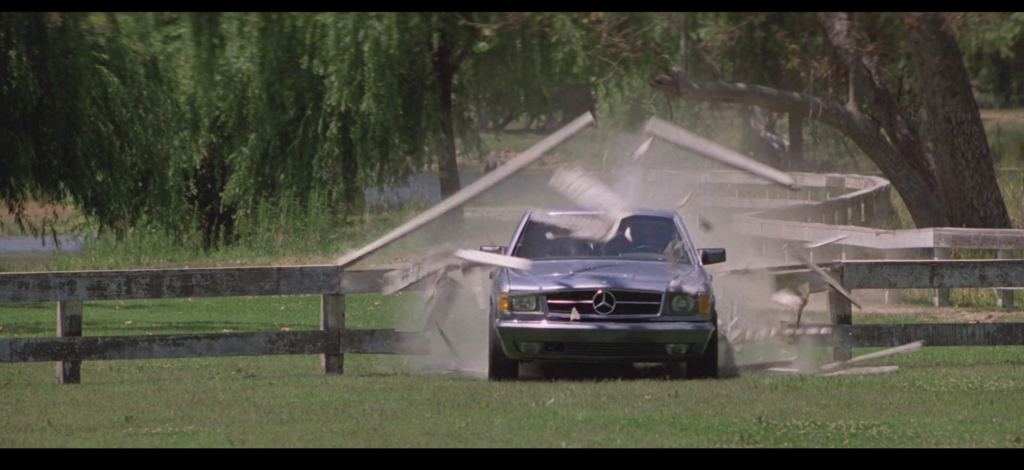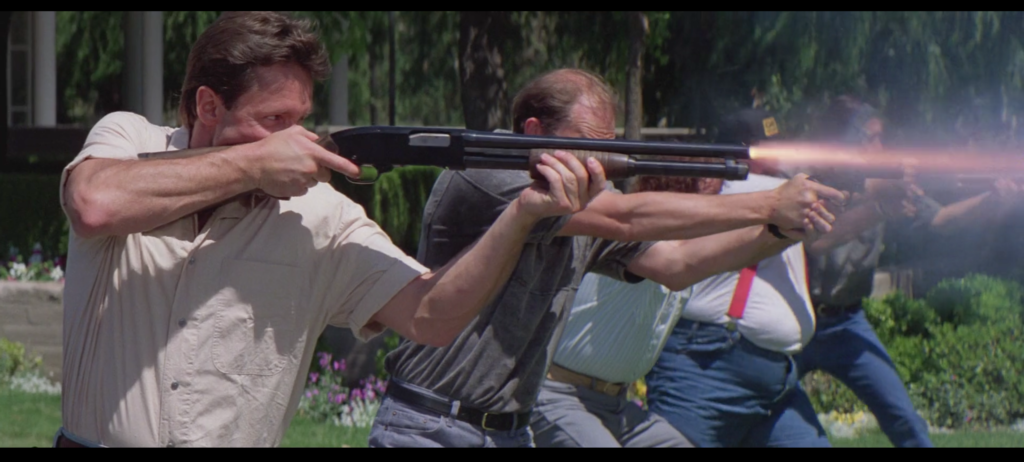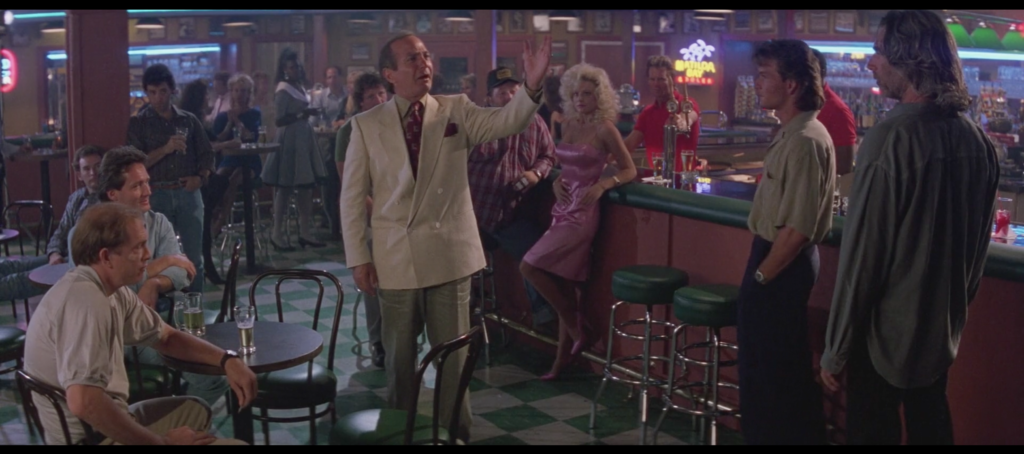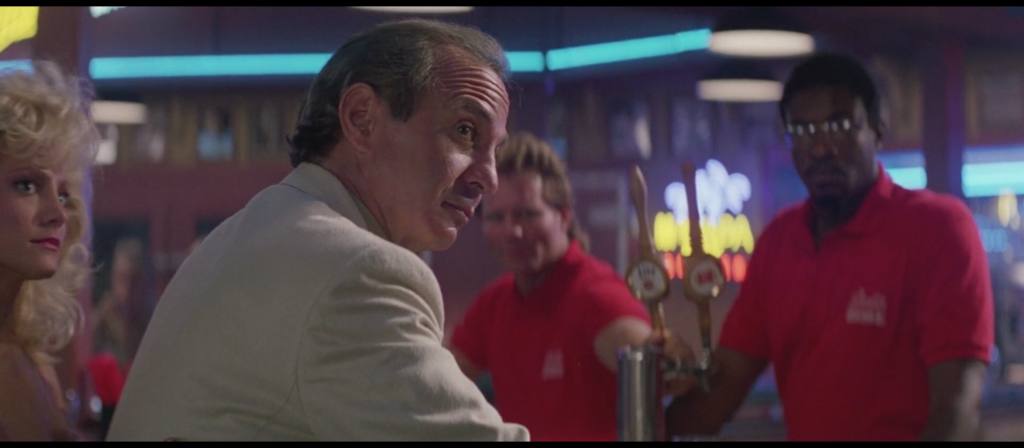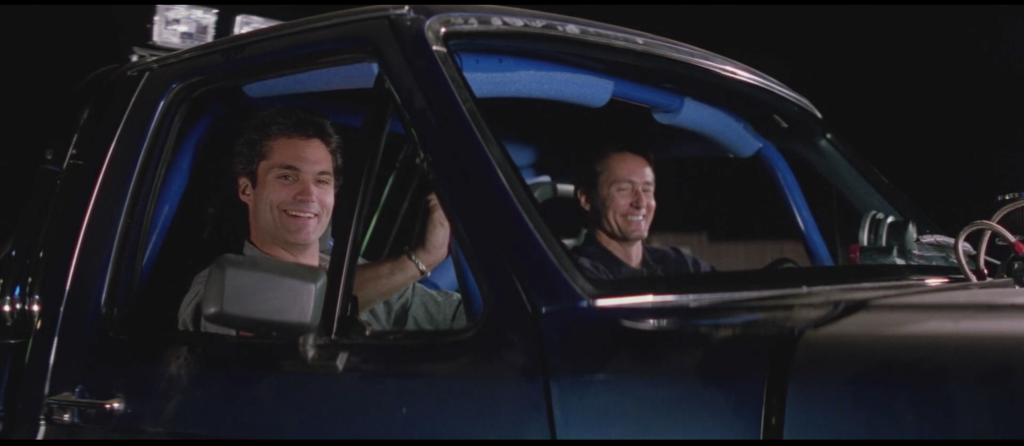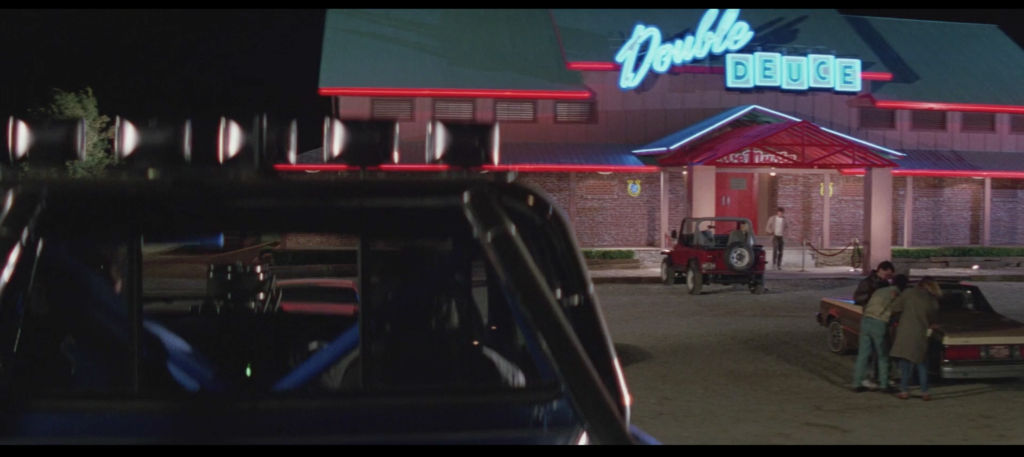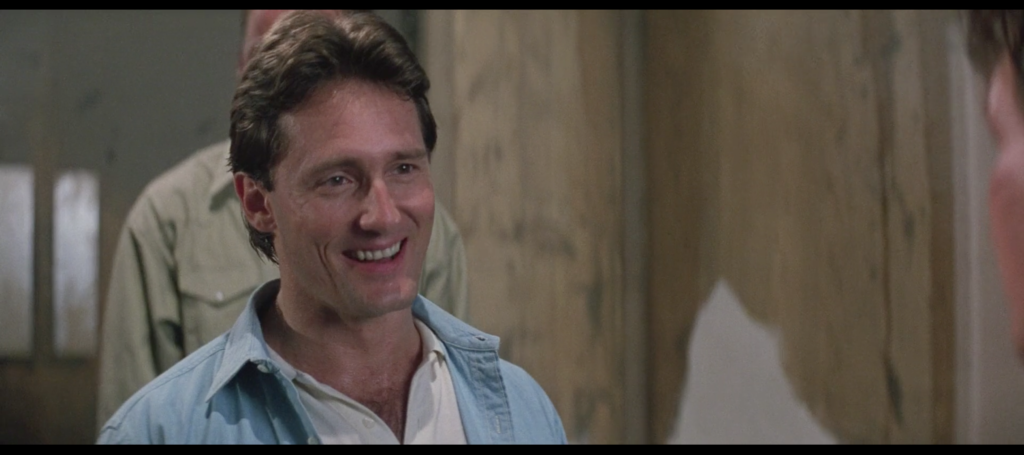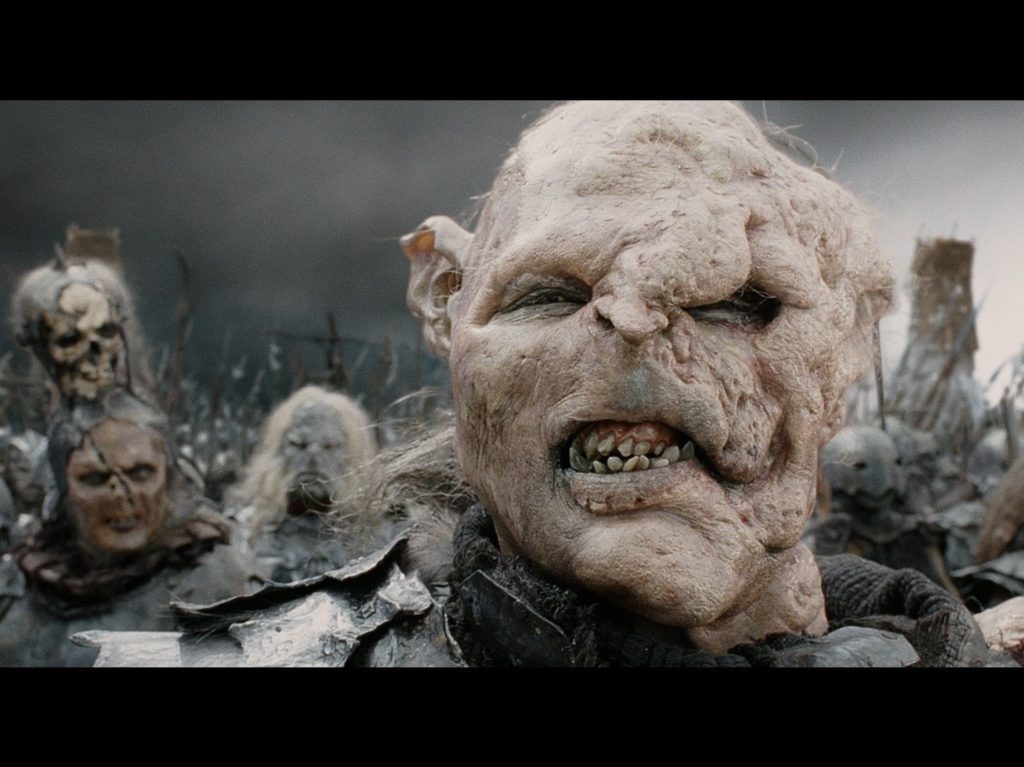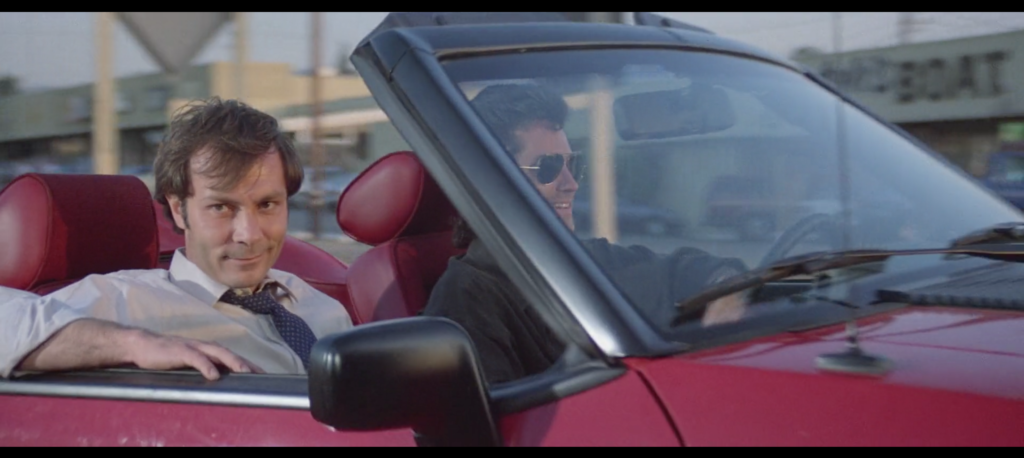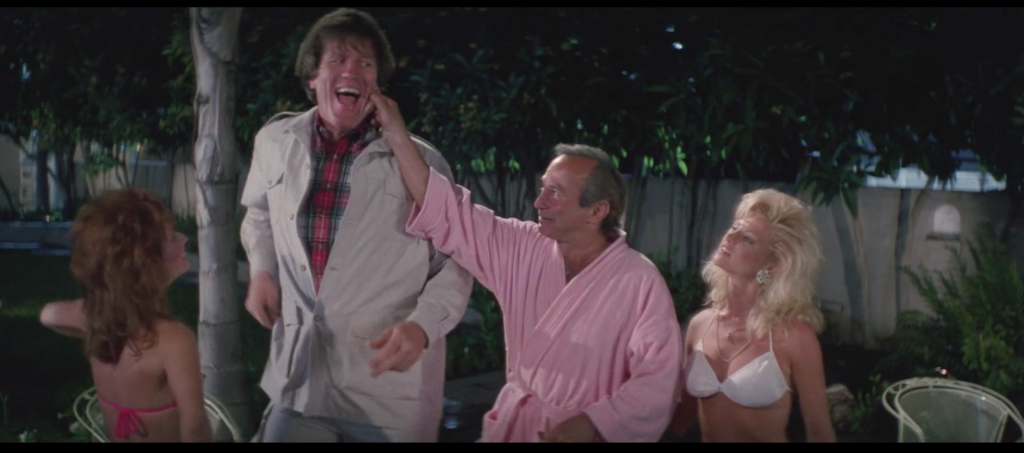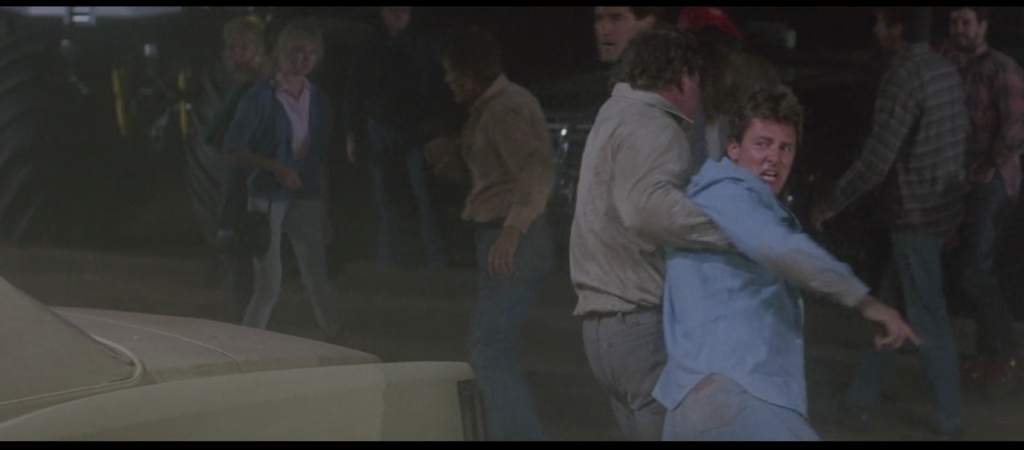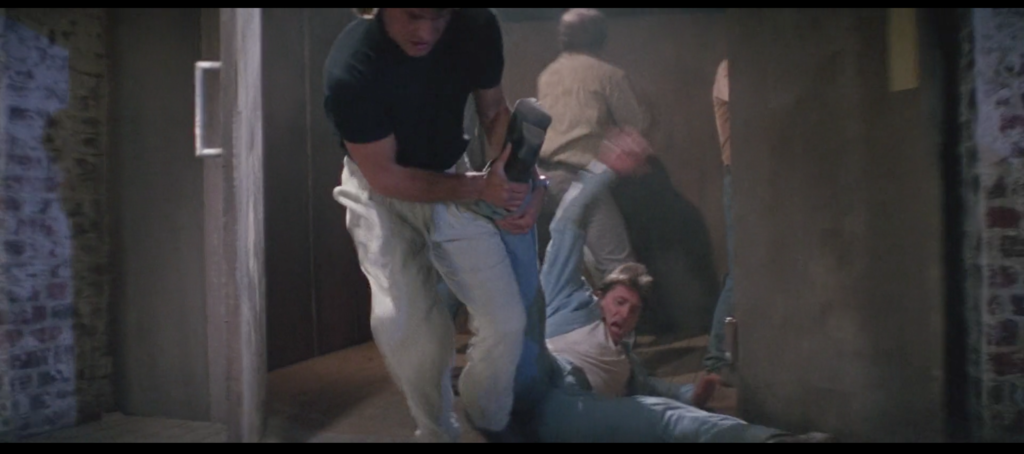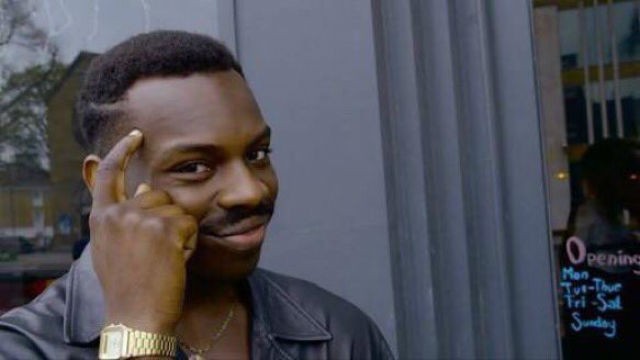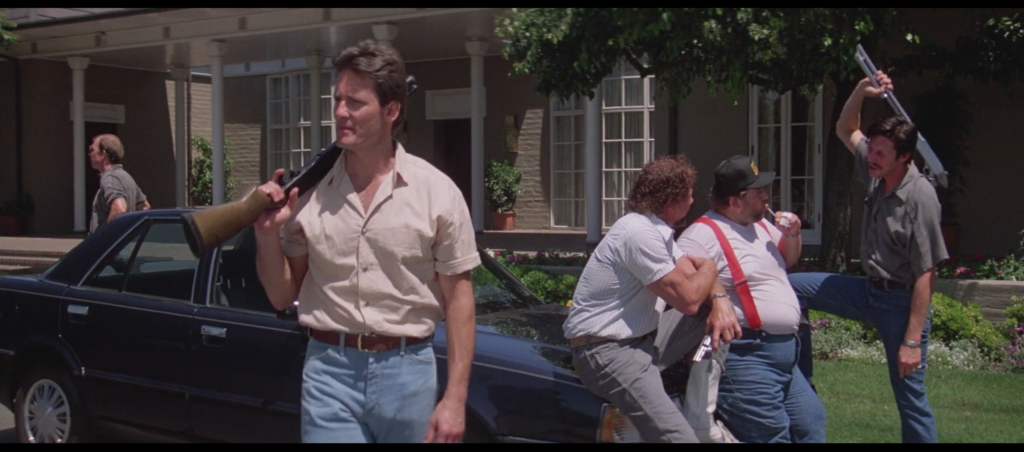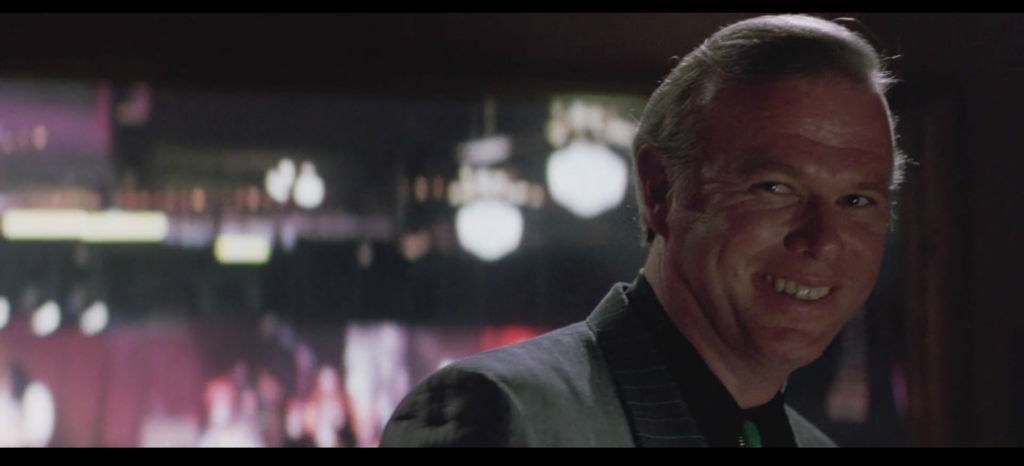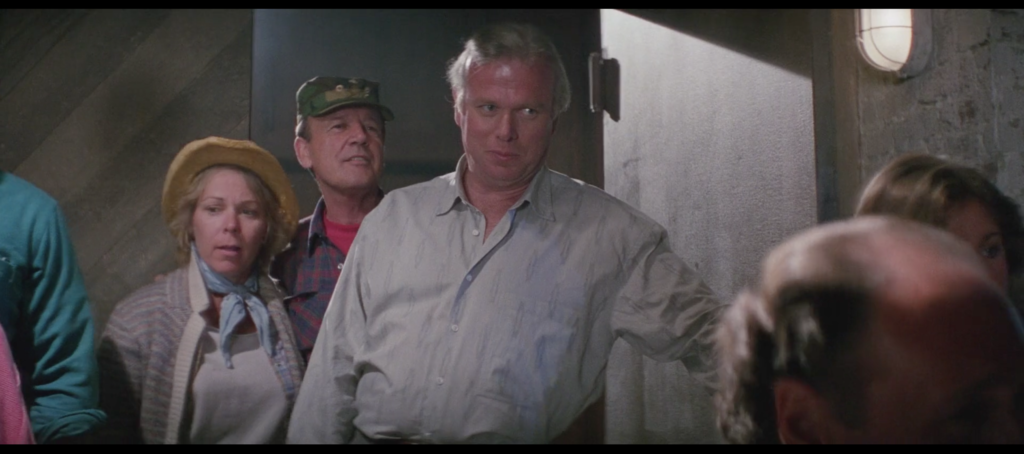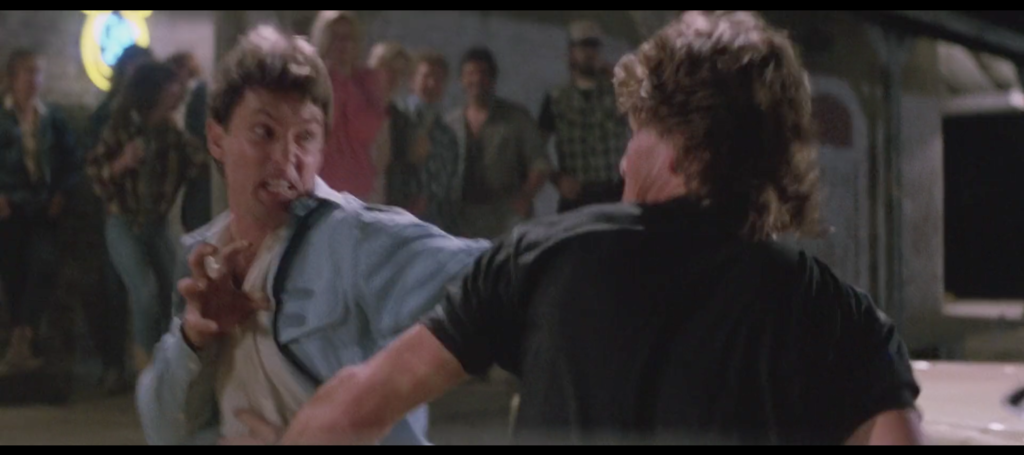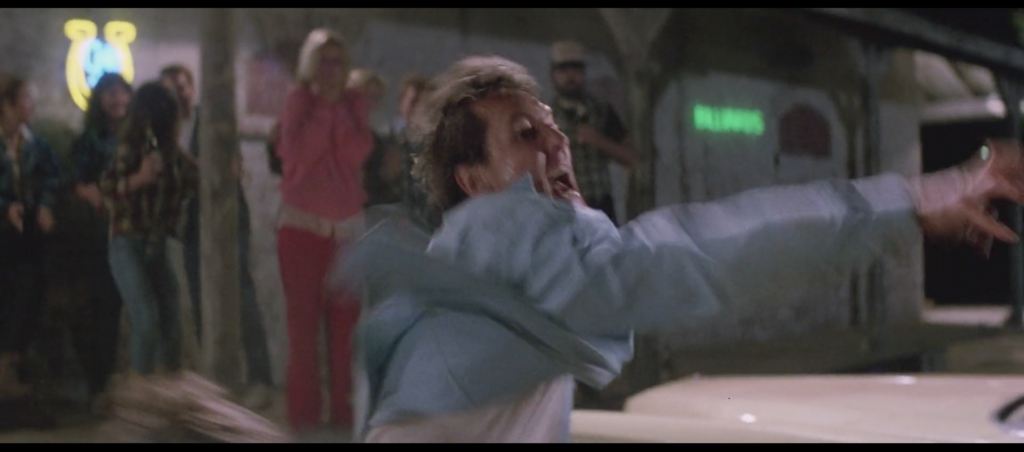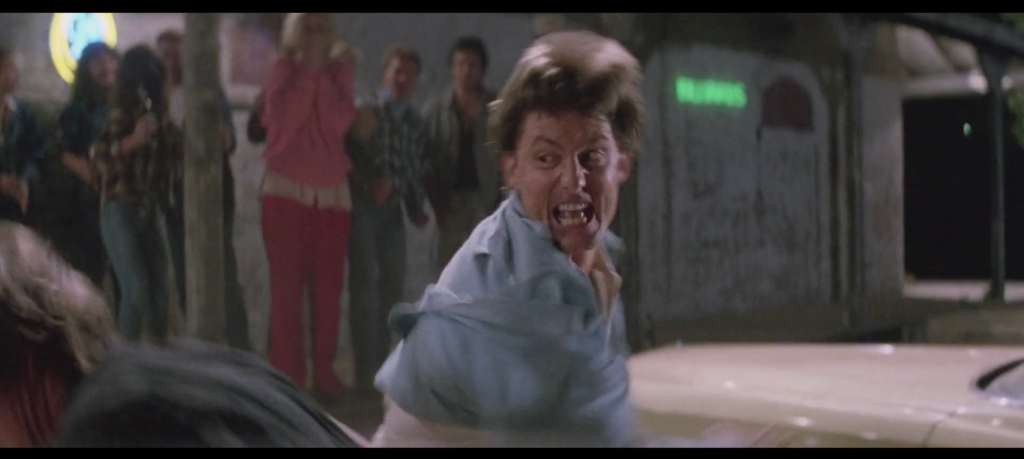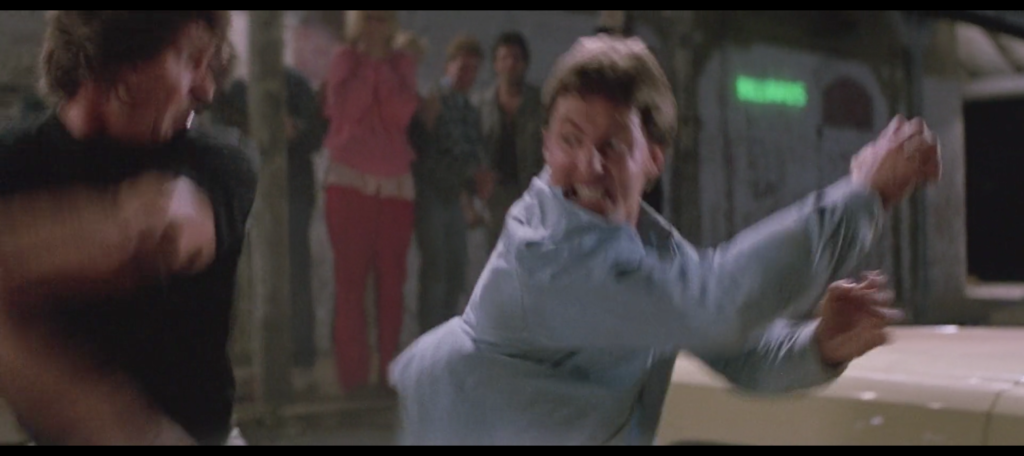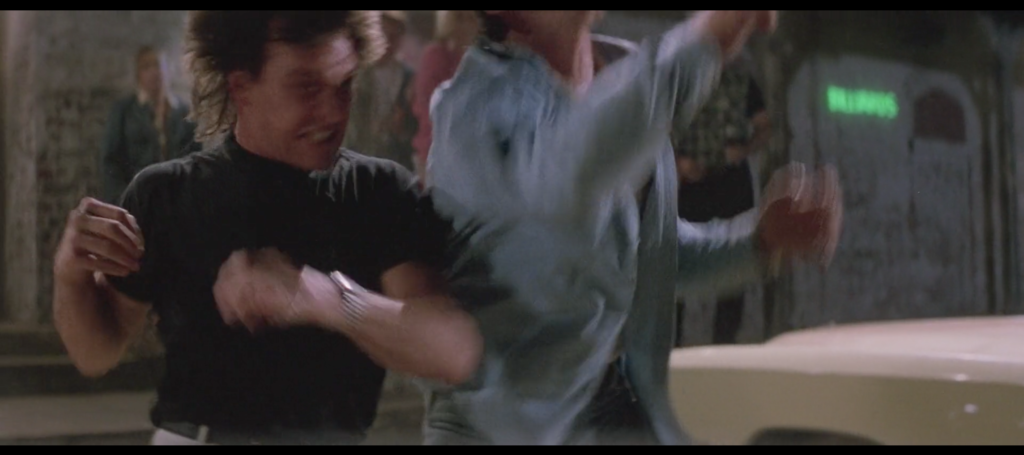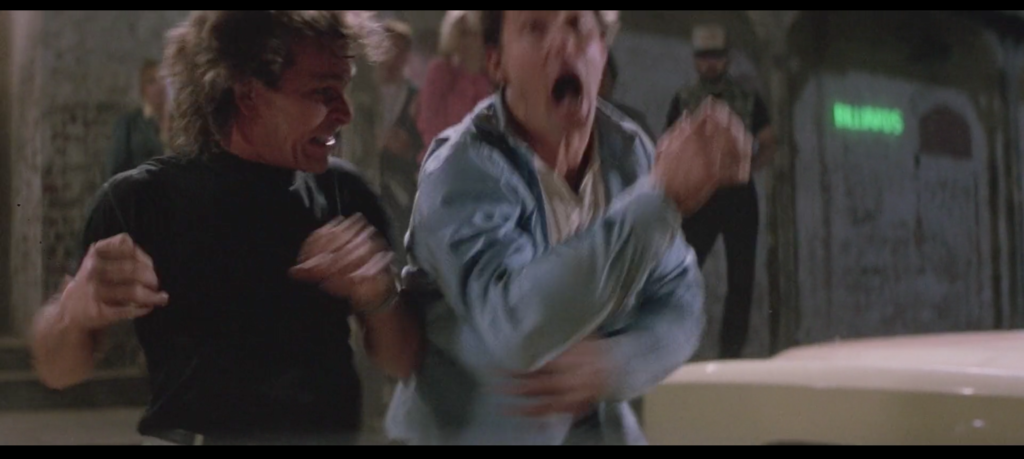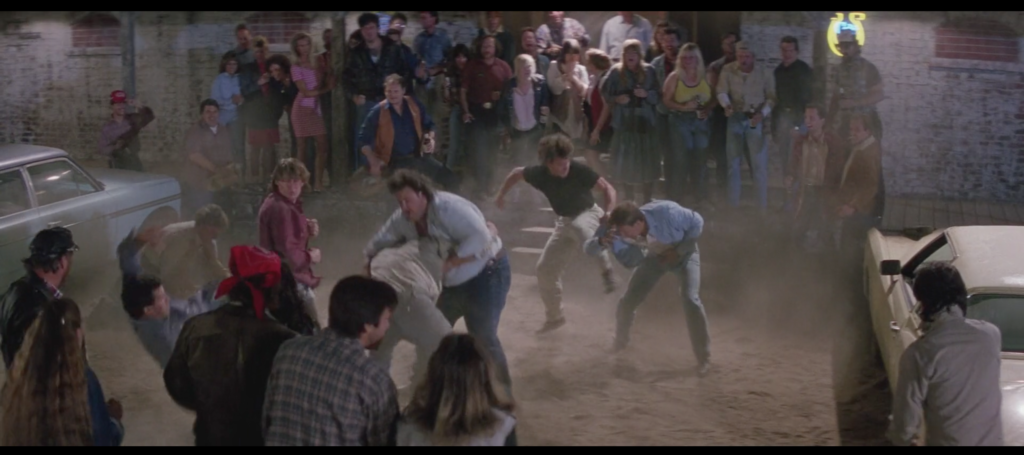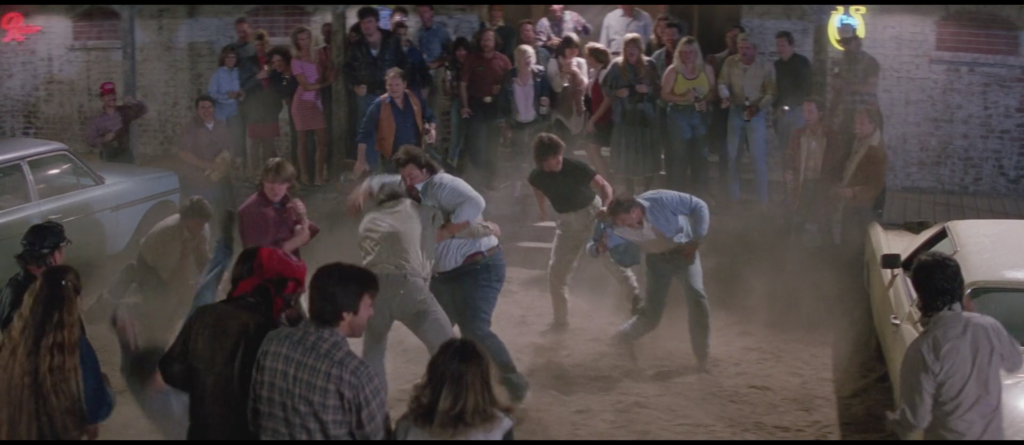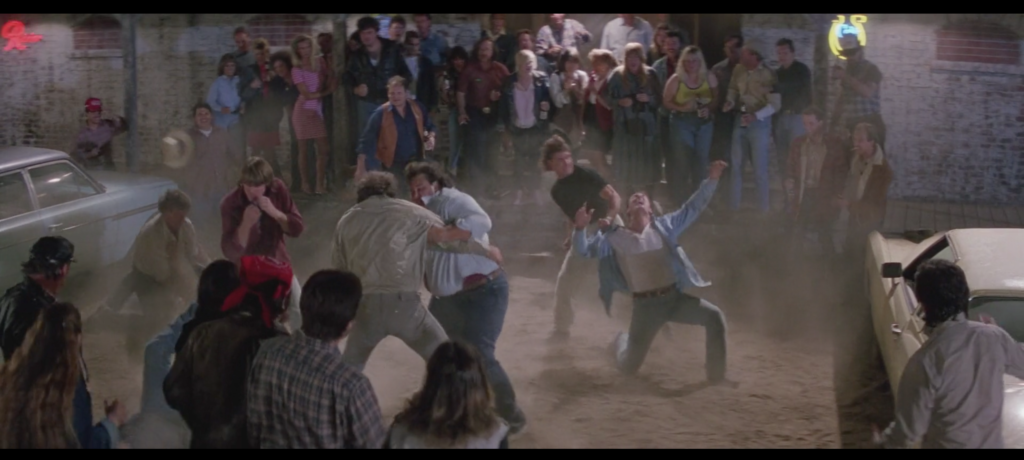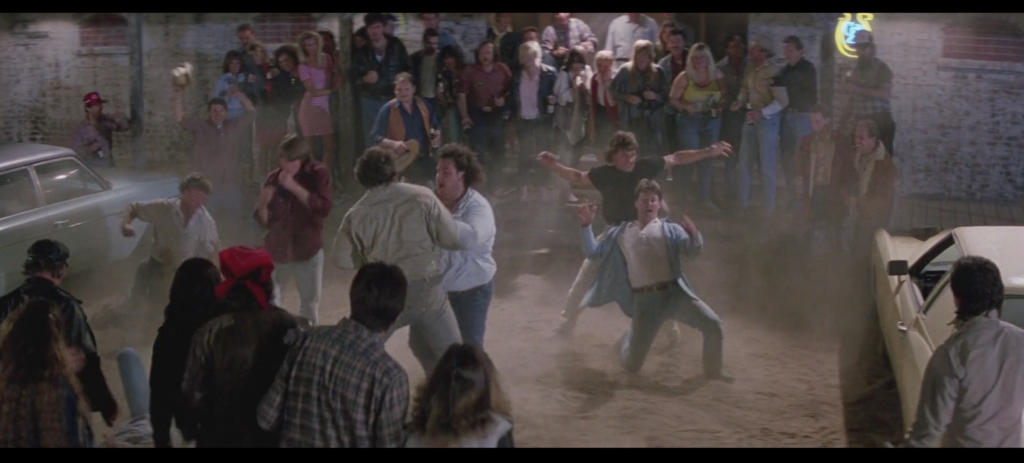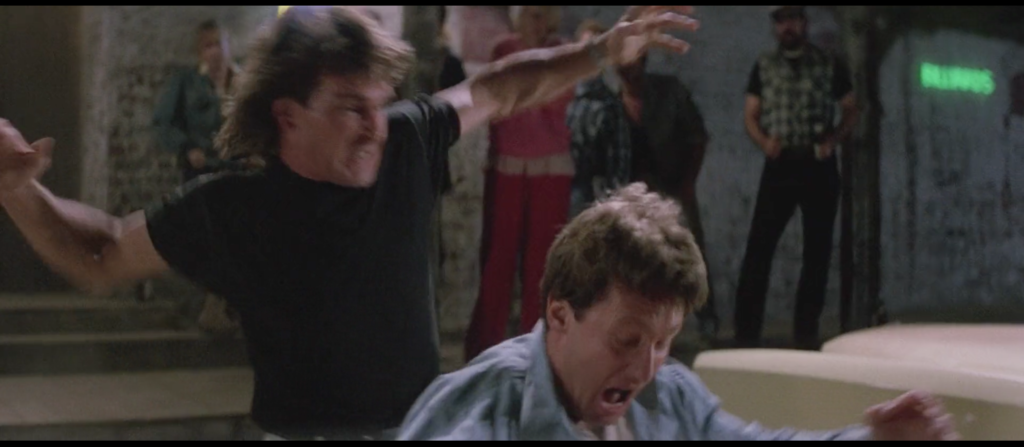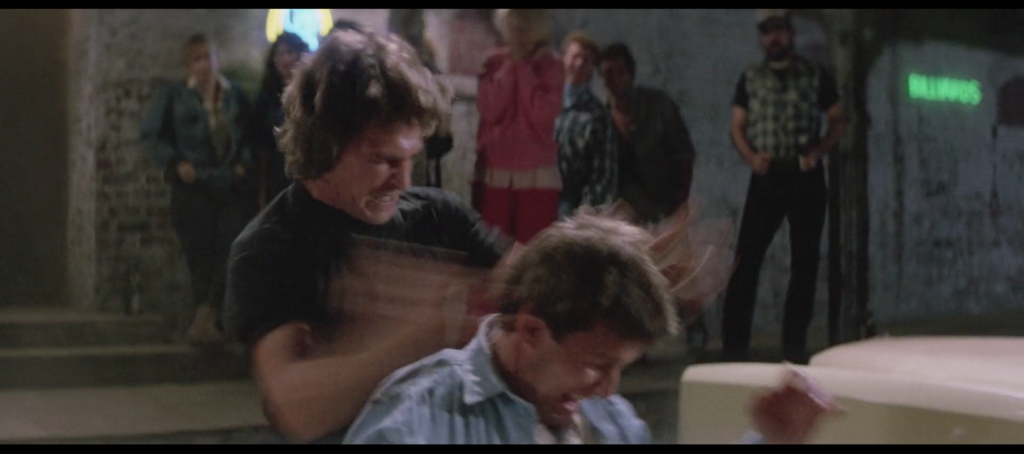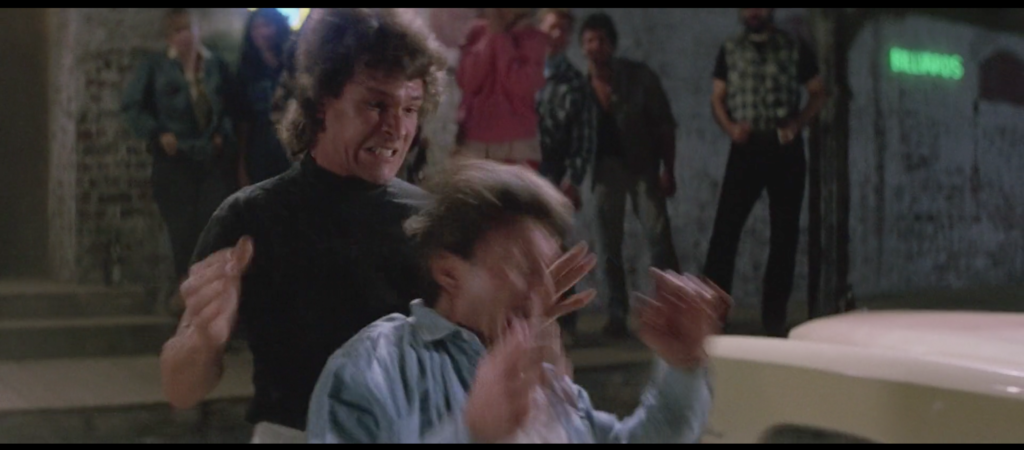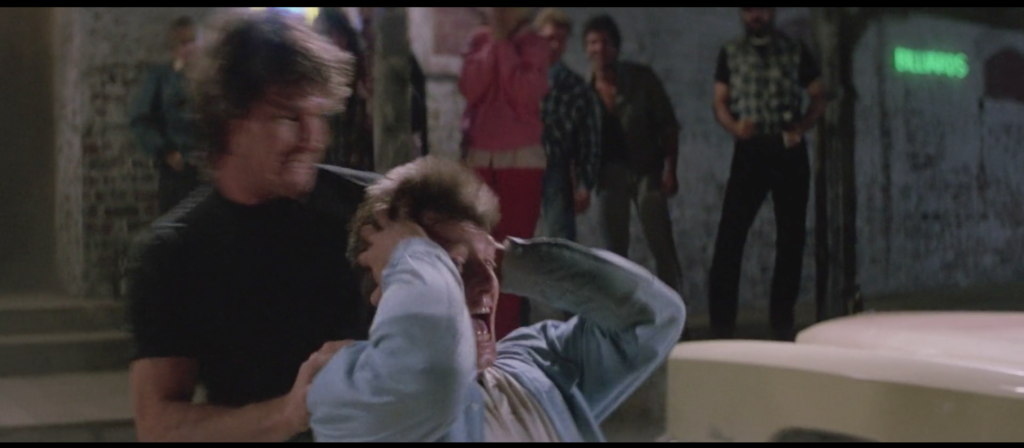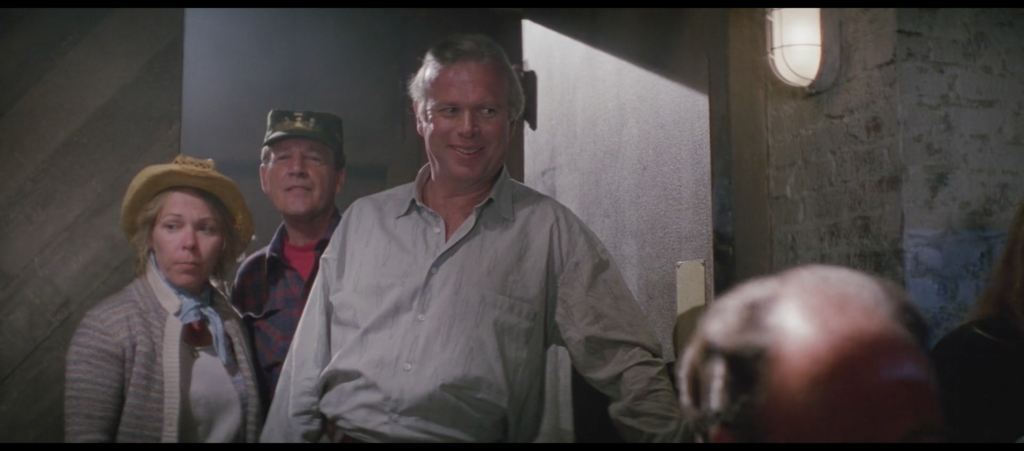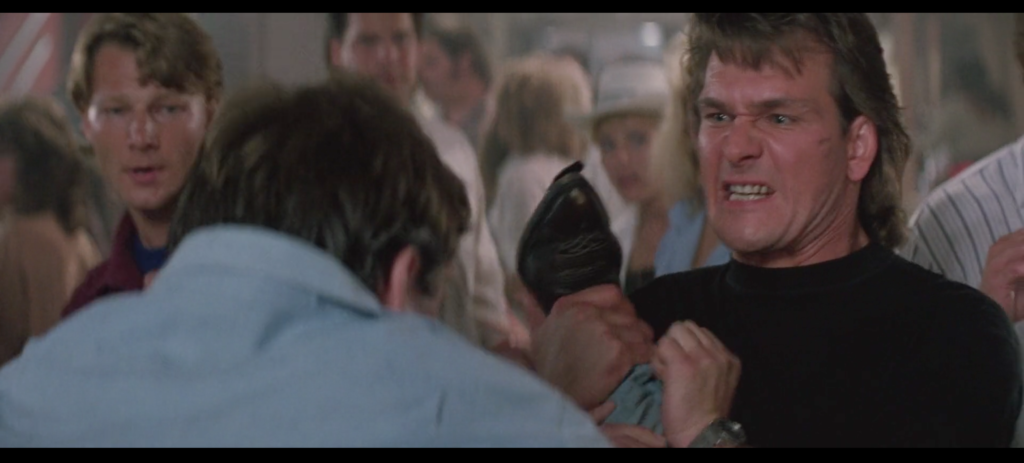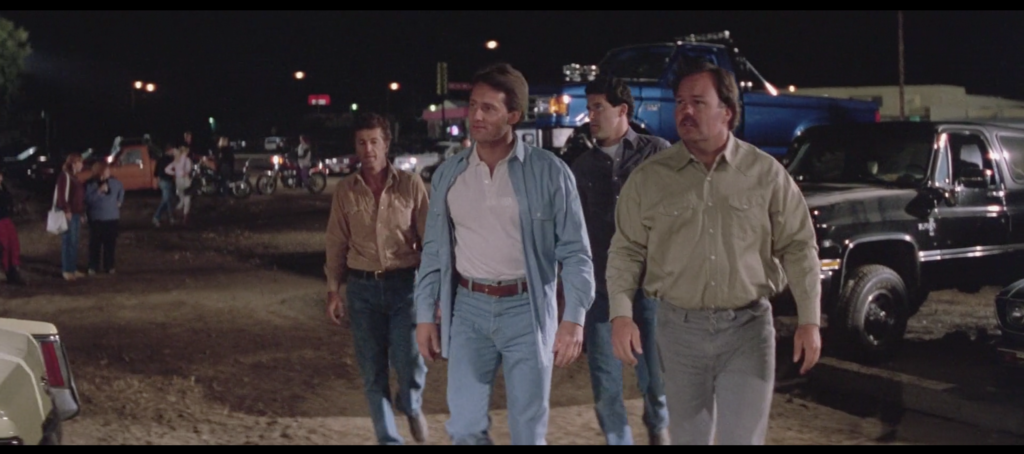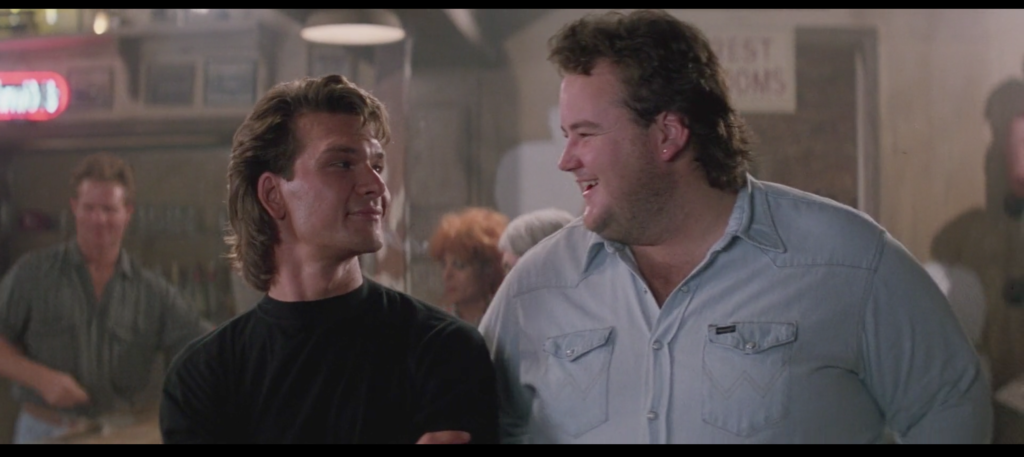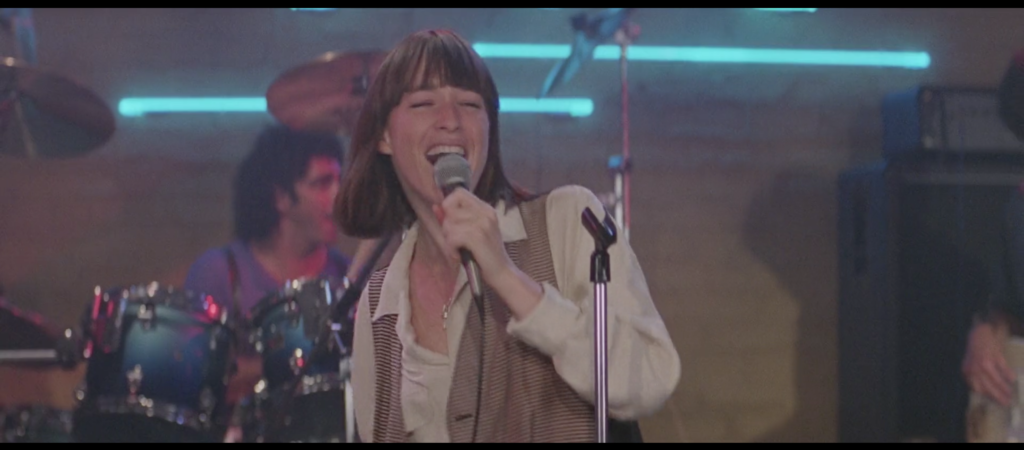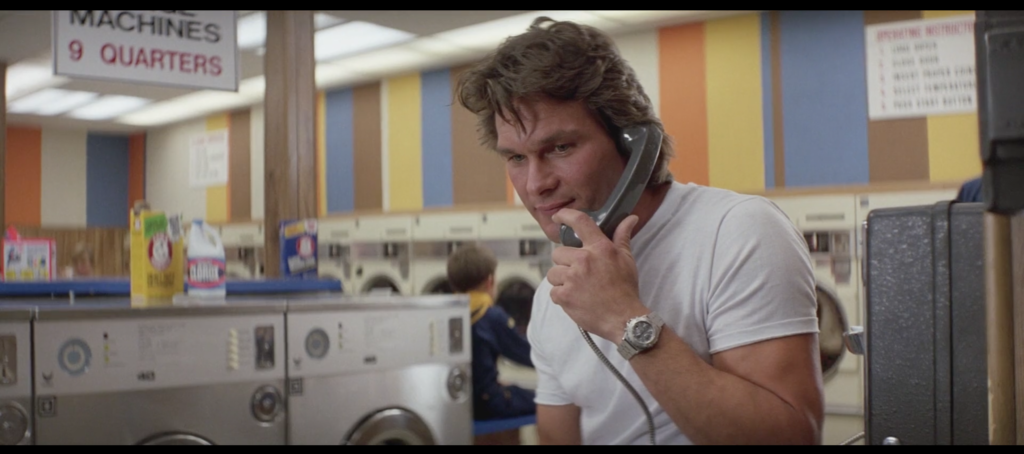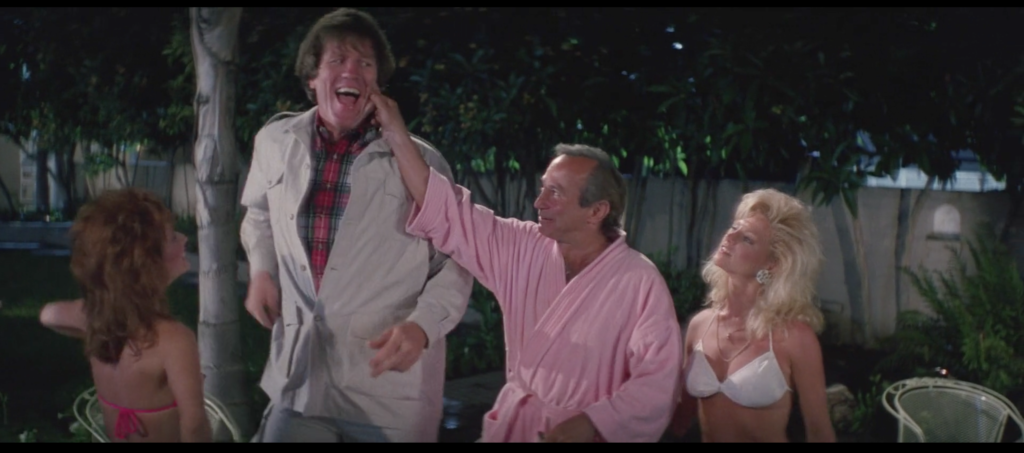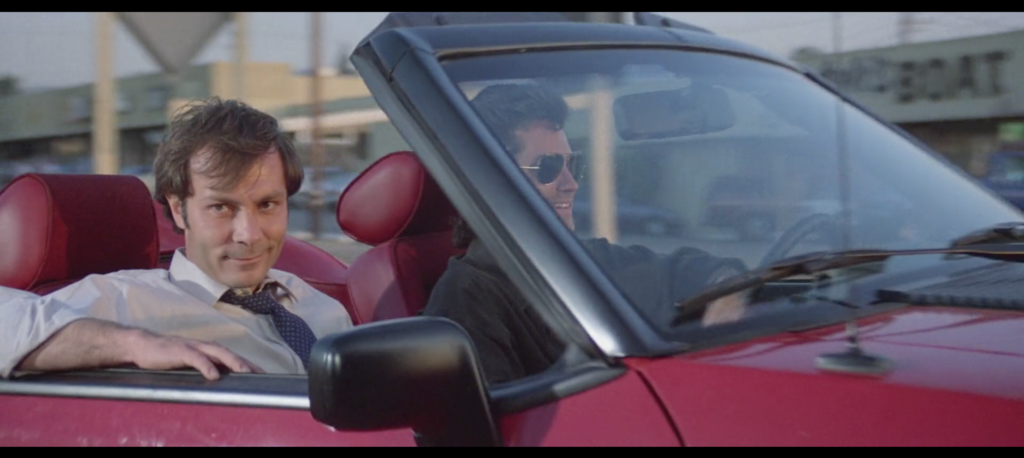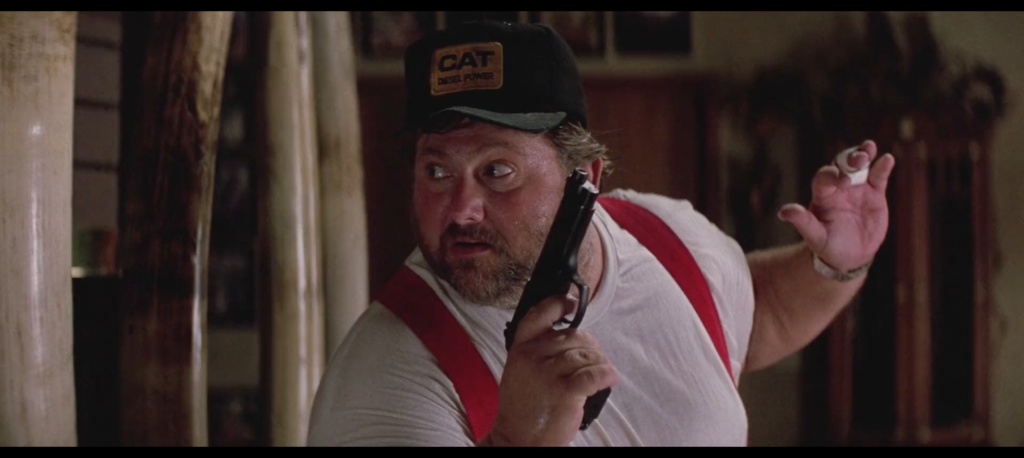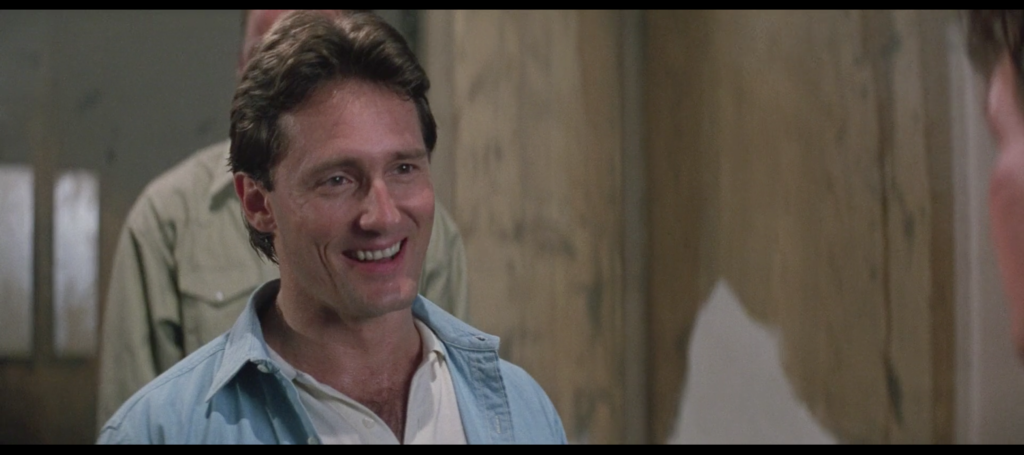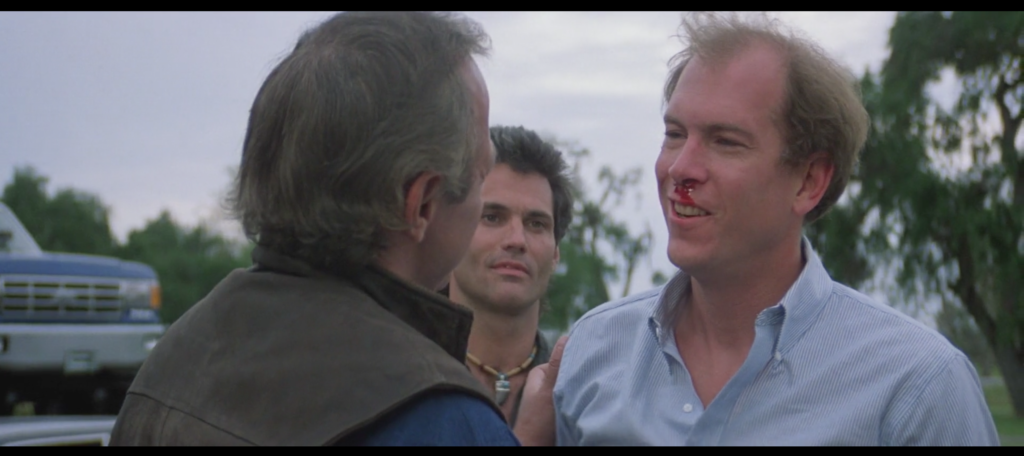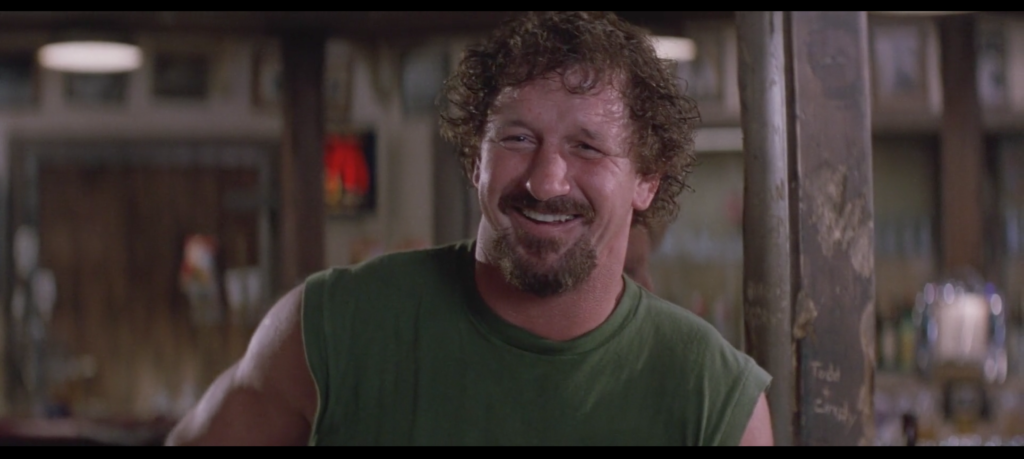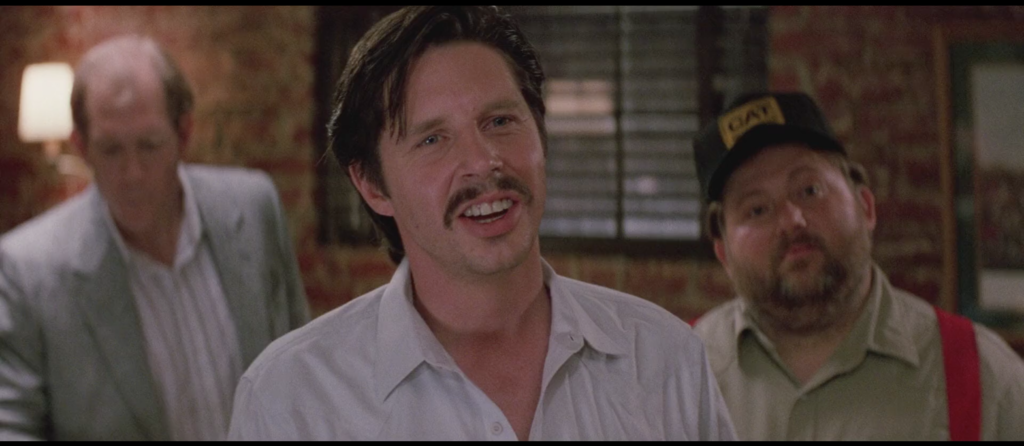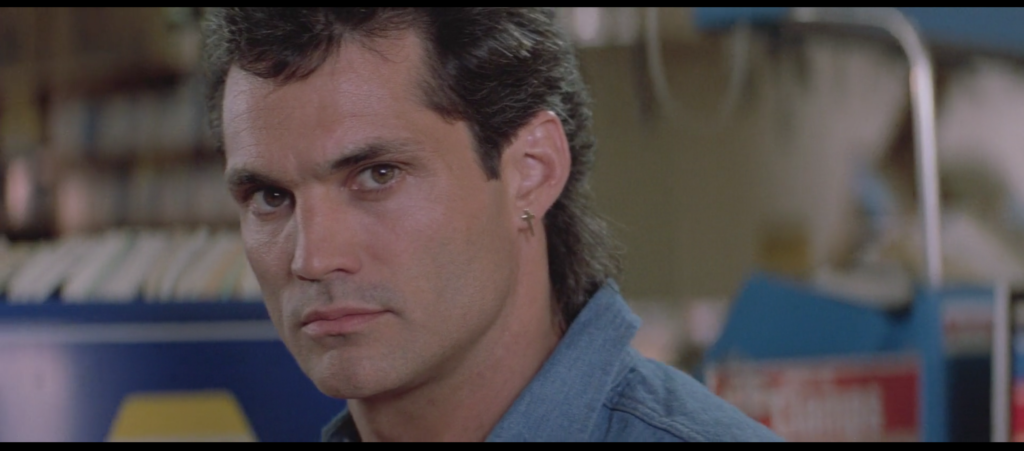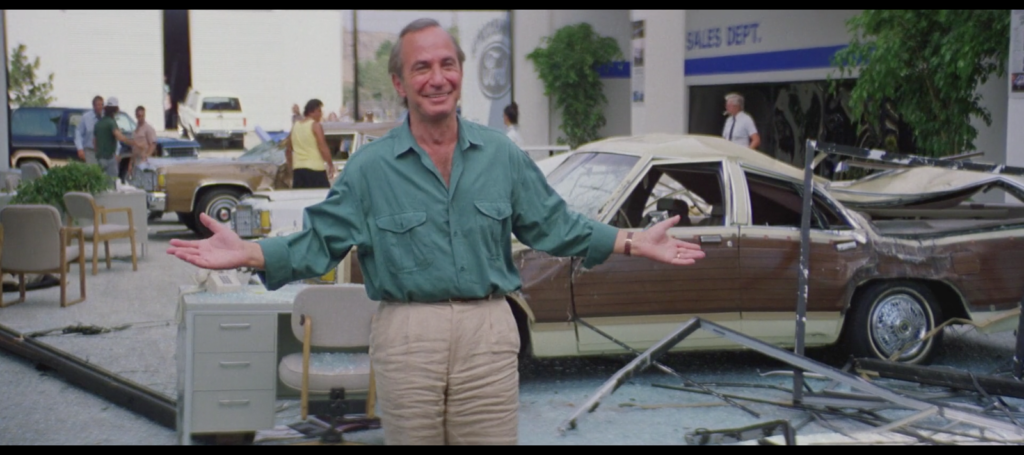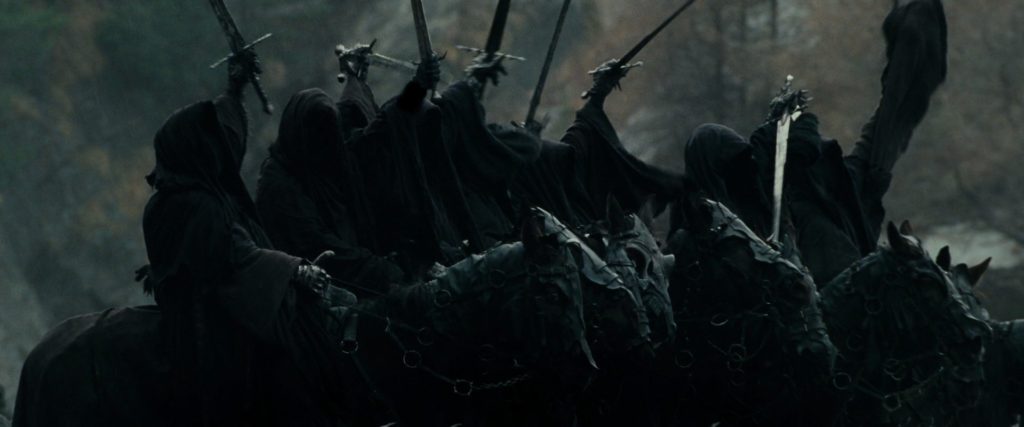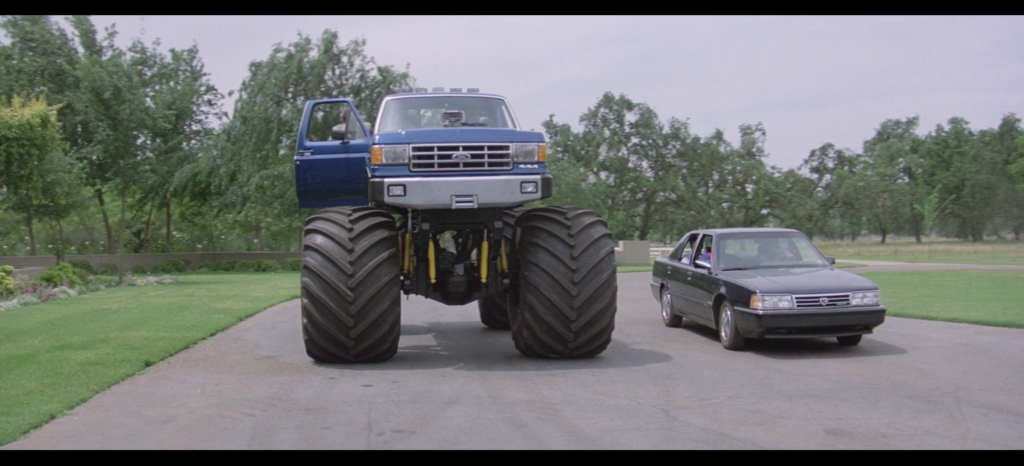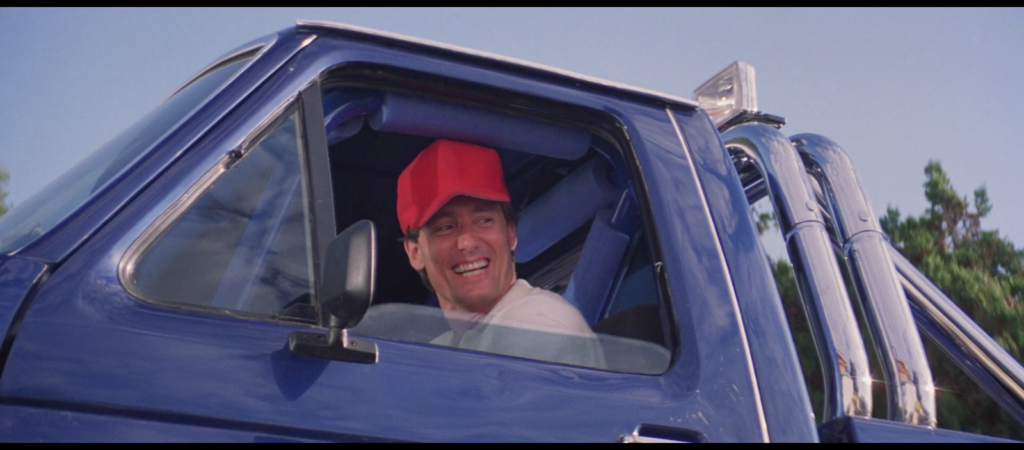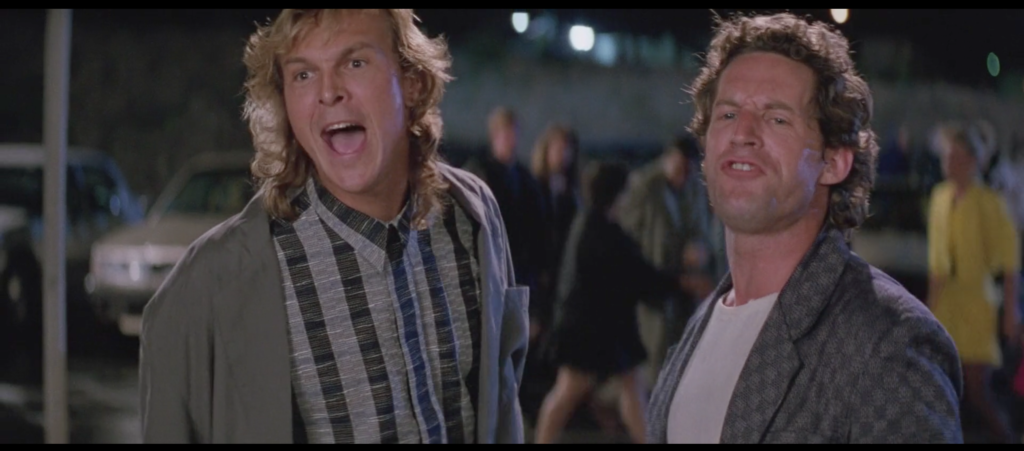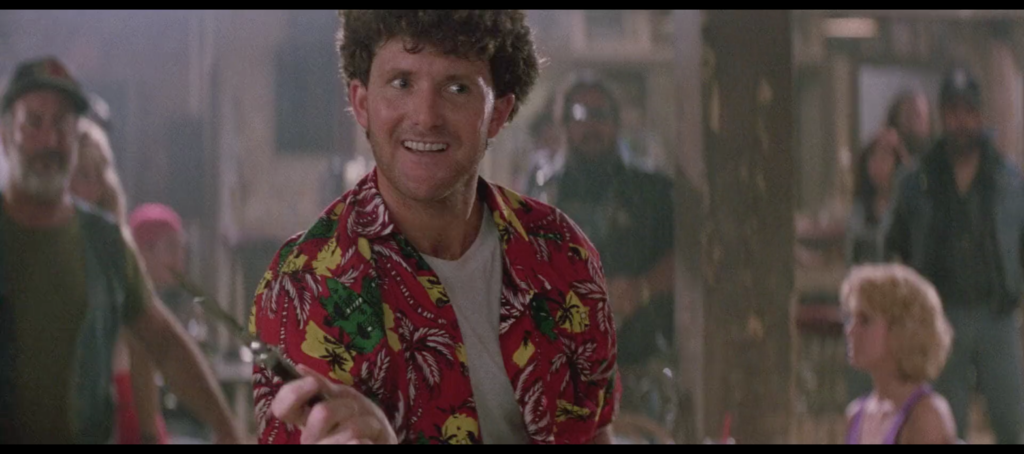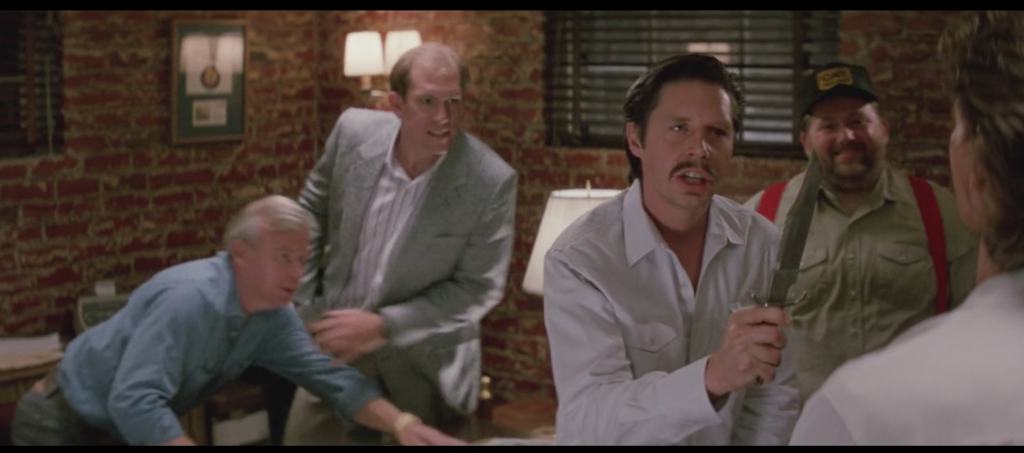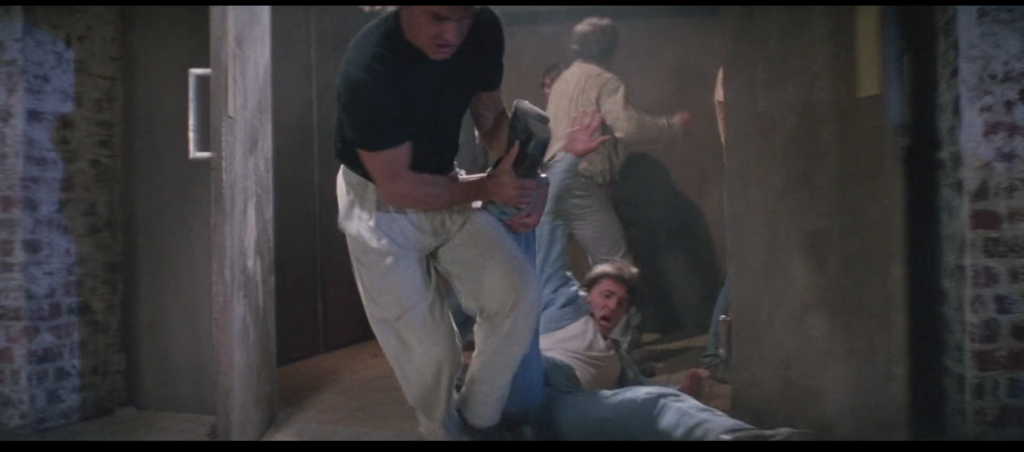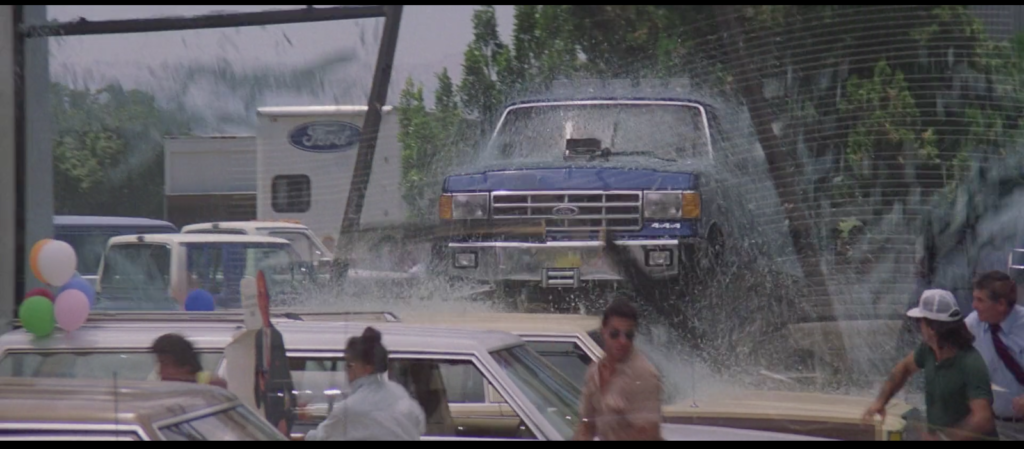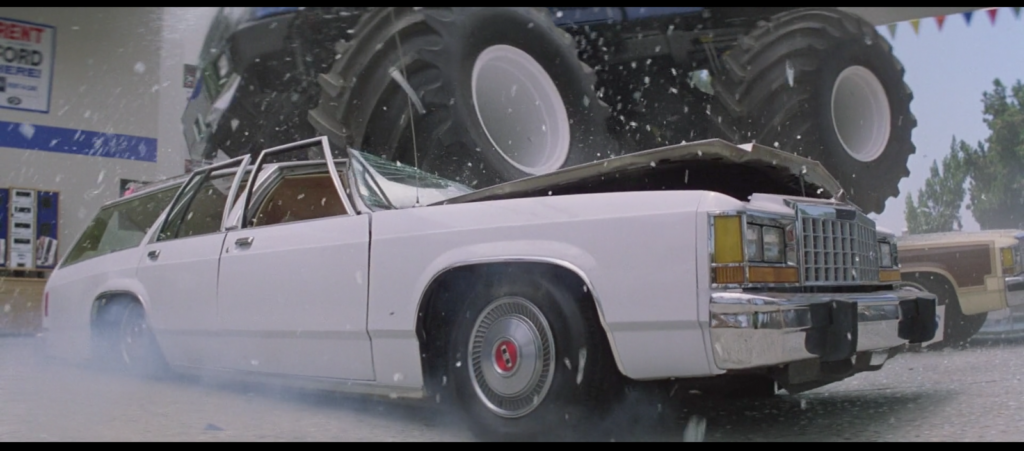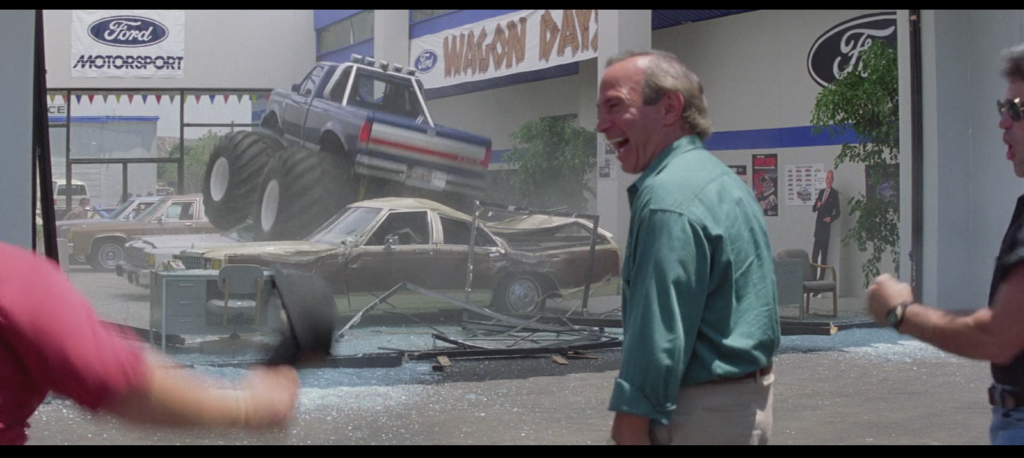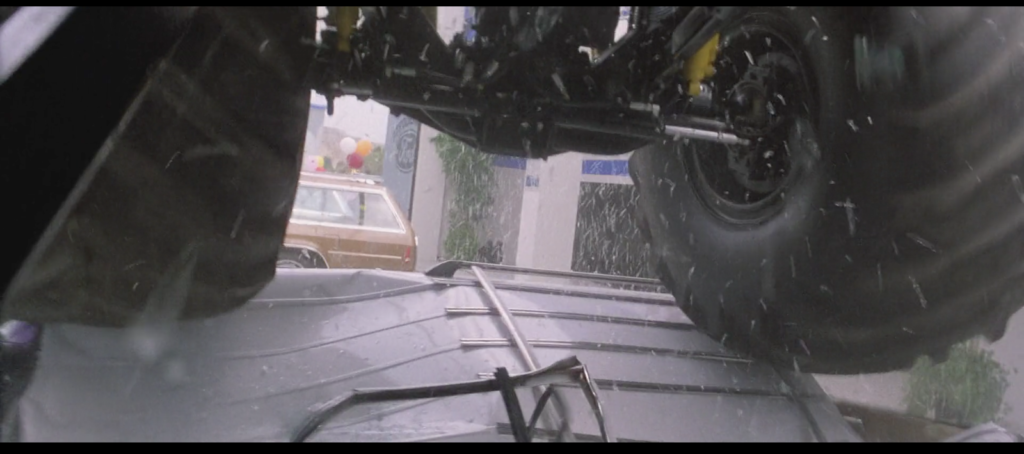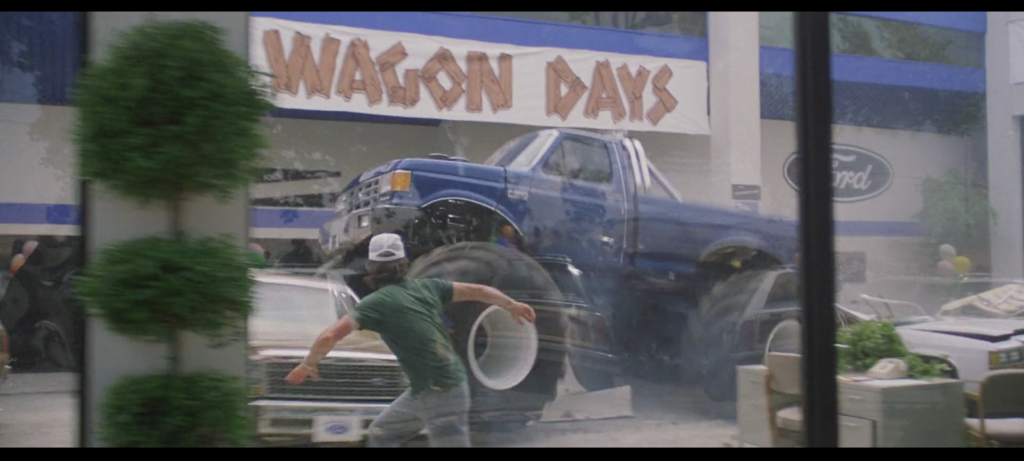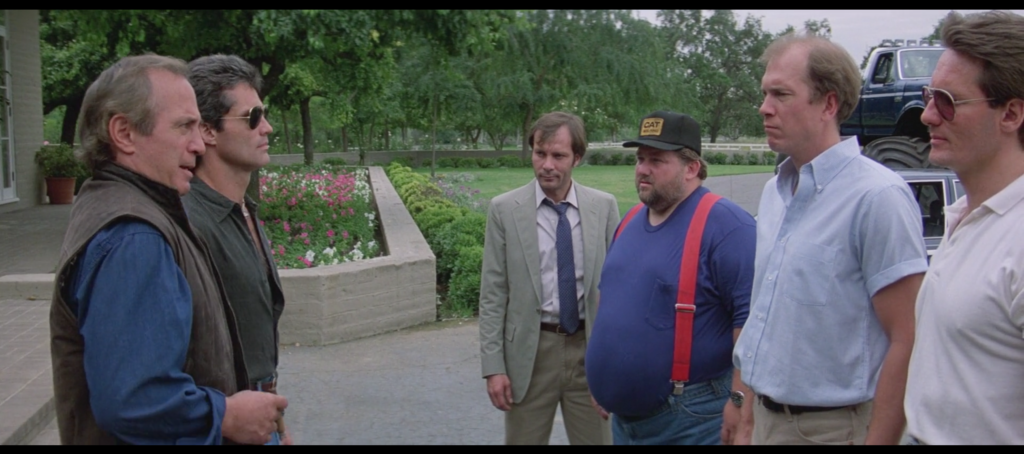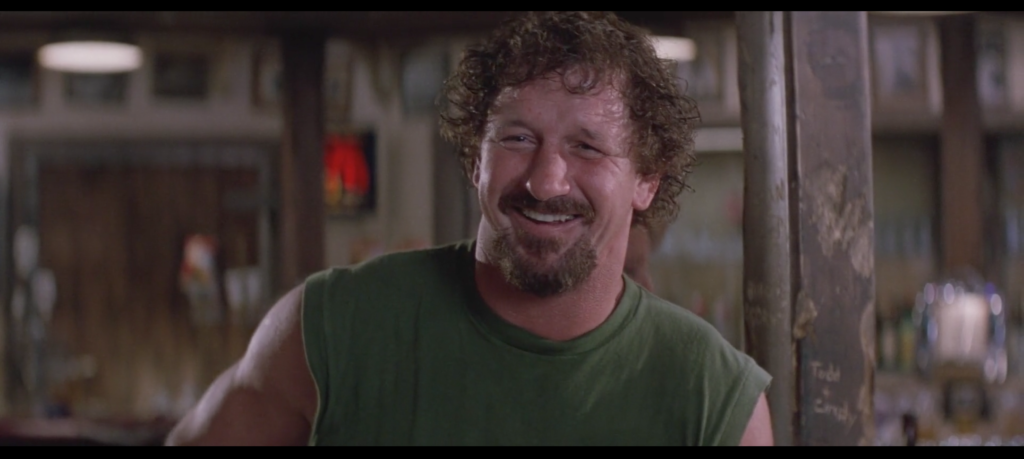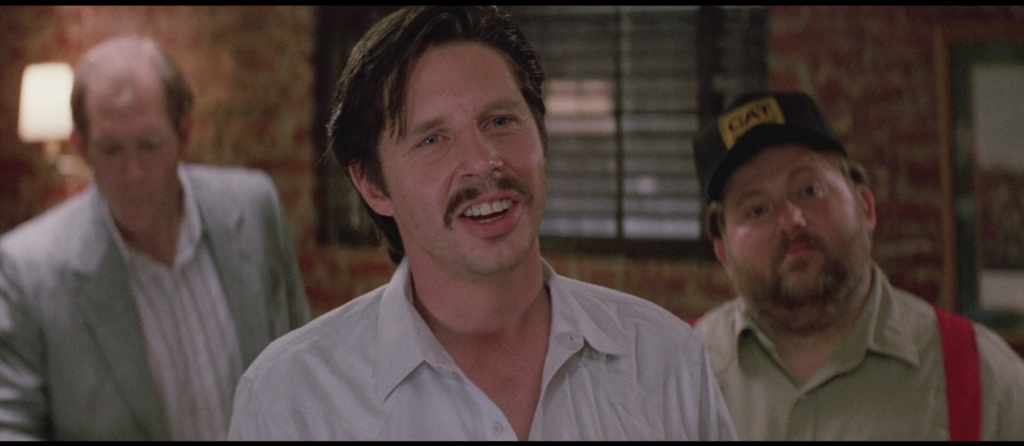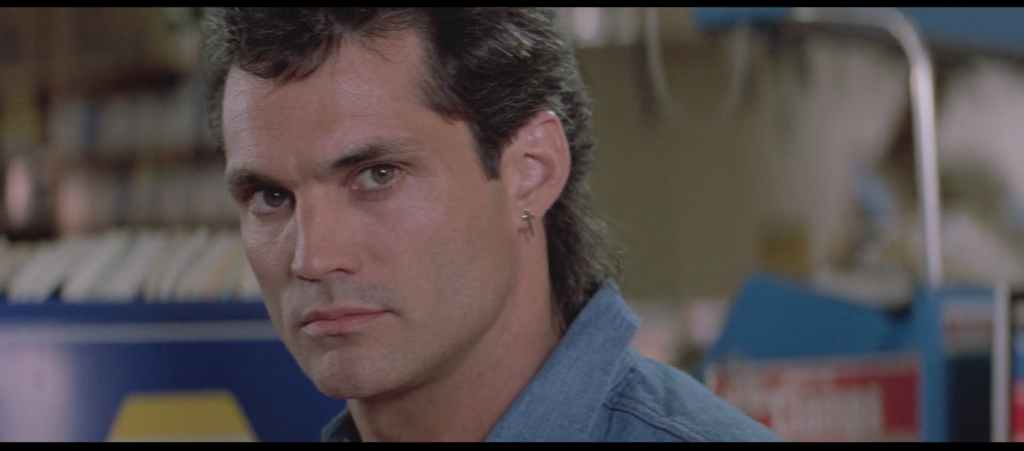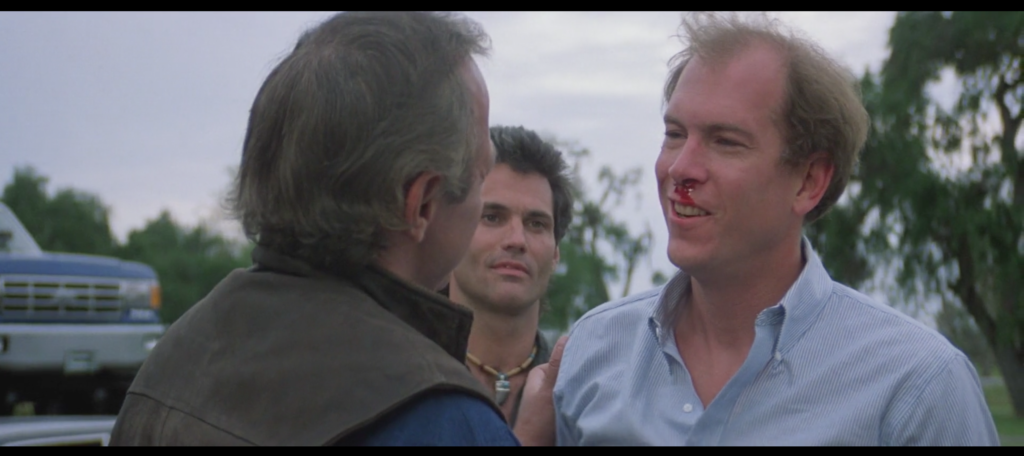Posts Tagged ‘ketchum’
327. Goons vs. Car
November 23, 2019After three star turns in under five minutes, Dalton’s car finally has its first fight scene. First and last, sad to say. It barrels towards Brad Wesley’s mansion at breakneck speed, plowing right through a fence and over a hedge to its appointment with destiny. Arrayed against it are Wesley’s five core goons who are a) alive and b) not Karpis—Ketchum, O’Connor the Bleeder, Morgan, Tinker, and Pat McGurn. There’s no jaw-jacking involved here. It’s on sight. They open fire with an array of shotguns and handguns—all of which raise the question of why they bothered with the fistfighting and knife-fighting in the first place. They certainly don’t hesitate to shoot Dalton’s Benz, and (they assume) Dalton himself, full of lead. Was it Jimmy’s death that lifted the shibboleth against straight-up murder by gunfire? Did Dalton bring this fusillade upon himself? Or at the very least on his car?
244. Infiltration
September 1, 2019The fox is in the henhouse. The rats are in the cellar. The weasels are in the corn. Using the conveniently timed explosion of Red Webster’s Auto Parts as cover, a large party led by Mr. Brad Wesley has infiltrated the Double Deuce. They expect the same things everyone does when they go to the bar: some drinks, some dancing, a little idle chatter. But they are arsonists and hired thugs, so naturally they’re not the sort of people who’d be allowed in the bar. Indeed, Morgan, Tinker, O’Connor, and Ketchum have all been expelled from the Double Deuce, bodily so in most cases. Only by distracting Dalton, Wade Garrett, and all the bouncers with the fireball outside could they even get in.
The presence of Wesley and his cronies is all but an admission of guilt, but it’s more than that. It’s a sign that Dalton’s control is slipping. He couldn’t stop these goons from getting in. As we’ll soon see, he doesn’t succeed in getting them out, either. Brad Wesley is calling, ordering, and firing the shots here, in that order.
The time to not be nice is here.
198. Dig a hole
July 17, 2019“Work ain’t work when you’re having fun.” By Jimmy’s own definition, then, his bit of late-night = espionage outside the Double Deuce, where he and Ketchum catch Dalton and the Doc meeting up, isn’t work. The two men are having an absolute blast discovering that their boss Brad Wesley’s ex-wife is dating his new-in-town nemesis.
“Uh-oh…” says Ketchum wryly as they take it all in.
Jimmy chuckles, rears his head back slightly, and says “Dig a hole.”
The two men then chortle and guffaw at the prospect that one or more of the people they’re spying on will be slain and buried in an unmarked grave for the crime of being an item. It’s all in the way you tell it, I guess.
It’s a noteworthy moment for several reasons. First, it’s one of the few chances we have to see goons goon it up all on their own: no one to intimidate, no one to suck up to, just two peers enjoying their job together. We’ve seen how different Dalton feels under similar circumstances, chatting with old friends like Cody and Wade Garrett. We’ll see a bit more of it among the goons near the end of the film, when Pat, Morgan, and Tinker take a few moments to discuss a young woman of their acquaintance, before Dalton assaults the mansion they’re guarding and murders most of them. The same principle applies here. Left to their own devices, out from under the watchful eyes of either Dalton or Wesley, they’re good-time Charlies. In actor Marshall Teague’s full-throated rumble, “Dig a hole” may as well be “Laissez les bon temps rouler.”
Second, we get a glimpse of how they see their own boss through this instinctual, jocular reaction to what they’re observing. They don’t say “Uh-oh, I wonder what the boss is gonna say,” or even “Uh-oh, the boss is gonna be pissed.” They jump straight to “Uh-oh, it’s murderin’ time.” When they see Brad Wesley’s ex with another man, they just assume that someone’s gonna die for it, presumably at their hands or the hands of their fellow goons. It’s just how things are done here in Jasper. This off-hand wise-aleck remark reveals as much about life under Brad Wesley as Karpis tossing Red Webster’s store or the whiskey getting cut off at the Double Deuce. More, perhaps.
Third, see the eyelines in that image above? Jimmy and Ketchum are looking downwards from the front seat of their vehicle to spy on Dalton and the Doc. That’s because their vehicle is a monster truck.
Admittedly, such a vehicle presents certain advantages on a reconnaissance mission, providing mobile high ground from which to observe the surroundings. On the other hand, and see if you follow me here, they drove a fucking monster truck to a stakeout.
They’re in the same goddamn parking lot, no less! It’s not like they could be inconspicuous if they wanted to, but they’re not even trying to hide it.
Why do neither Dalton nor Elizabeth notice the professional killers staring at them and yukking it up while perched some ten feet in the air in a comically massive motor vehicle? Maybe all that smoke blurred Dalton’s vision. Maybe his cooler-sense fails him when he’s horned up. Maybe there are enough monster trucks tooling around the streets of Jasper that Dalton would have no reason to believe this is the one driven by the guy who tried to kick him to death. Maybe—and again, stay with me here—it’s an extremely goofy movie. It’s a matter of opinion, I suppose, and you know what they say about opinions. Just remember, “Dig a hole” is not an opinion. As far as Jimmy’s concerned, it’s a spoiler.
160. How to Build a Better Goon
June 9, 2019Ketchum is a forgettable goon. That’s just facts. I know who he is because I’ve watched Road House a million times, and you know who he is because you’re reading this series of daily essays about Road House. But it took me a long, long time, and many, many viewings, to put Ketchum together, as it were: that he drives the monster truck any time it shows up; that he’s the guy who tries to kick Dalton in the head with the knife in his boot and gets his ass kicked instead; that he’s the man who kills Wade Garrett, as evidenced by his retrieval of the knife used to kill him and insertion of that knife into a custom sheath on his hip; that he’s the last goon to tangle with Dalton hand to hand; that his name is Ketchum.
Alone among the goons present for the climax of the film, no one even says his name in the movie, a privilege afforded to Pat McGurn, Morgan, O’Connor, Tinker, and Jimmy. I’ve made a fuss about this over the past few months, alleging that it’s one of the reasons he’s so forgettable. But I’ve been thinking about that assertion lately, because I don’t think it has to be that way.
Consider the orcs.
Remember these handsome fellas? Sure you do. That’s Lurtz, Grishnakh, and Gothmog, from Peter Jackson’s Lord of the Rings trilogy. No one says their names in the movies. No one says any orc’s name in the movies. For that matter, Lurtz is a made-up name for a brand-new character the filmmakers introduced, and Gothmog is simply their best guess as to what a Mordor commander from the books whose species isn’t even specified by Tolkien might be like.
But if you’ve watched those movies recently, or if you find them memorable at all, you probably recall them as the uruk-hai leader with the Ariana Grande hairstyle whose head gets chopped off by Aragorn after a big fight, the raspy-voiced weasel who tries to hunt and kill Merry and Pippin before Treebeard squishes him, and the leader of the orc assault on Minas Tirith with the big puffy pink face. You remember how they look, how they sound, and what they do, because Jackson and company made a big point of giving them memorable introductions, isolating them with distinct camerawork (closeups, angles, whatever the case), and having them do their most memorable stuff right there for all to see. Lurtz was created to give the uruk-hai chasing the Fellowship a distinctive leadership figure so the film’s climax would work as such. It’s a far cry from the aggressively nondescript Ketchum first showing up as a non-speaking background character wearing face-masking sunglasses during the Bleeder scene and eventually killing Road House‘s secondary protagonist off-screen.
For that matter, it’s a far cry from these fellows.
Karpis and Mountain are also never named. They’re only shown in close-up in couple of scenes apiece; in Mountain’s case, one of those scenes is a pool party (in which Karpis appears in the background). Neither of them make it to the film’s final reel but it’s not because they get killed—they simply stop showing up, because that’s how Road House rolls.
But you remember them, right? They each have a distinctive look, with Karpis’s clothes from the Bun E. Carlos collection and Mountain’s sheer size. They each do something interesting: Karpis stares down Dalton, and Mountain dances like an idiot and later Sam Elliott tells him “I sure ain’t gonna show you my dick” before taking him down. The camera makes a point of both of them: Karpis stares right into it in closeup, while Mountain becomes the focal point as it follows Wesley and Denise into the pool party.
When it comes to differentiating your goons, bothering to say their name during the film helps, especially if you name half a dozen comparable characters during the film and run the risk of drowning the unnamed one out. (That doesn’t apply to LotR.) But you need the look, you need a distinctive action, and you need a memorable trick with the camera to make the look and the action click in the viewer’s mind. It’s a bit unfair to compare Rowdy Herrington’s work with Ketchum to Peter Jackson’s work in The Lord of the Rings, which is better at this than any other film I’ve ever seen. My point is simply, what’s in a name?
147. Look Back in Anger
May 27, 2019In addition to “embedding a knife in a boot” and “murdering Wade Garrett” and “being Mister Clean Jeans,” Ketchum has a leg up (wink!) on his fellow goons in one other respect: He is outraged that Dalton has the temerity to whip his ass. “Son of a bitch!” he shouts at the cooler as Captain Turner pulls him away, one boot on, one boot somewhere above the streets of Jasper. It’s the same verbiage employed by Carrie Ann when she brains some drunken dipstick with a beer bottle in the middle of that full-scale riot within the bar earlier in the film. She’s just a working woman trying to make a living and not get groped or punched or forced to bear witness to other people enduring the same. Ketchum is a paid killer who just attempted to murder a man by kicking him in the skull with a knife-shoe. That man intercepted the killing Rockette maneuver and simply followed the Three Simple Rules in response. But does this keep Ketchum from acting like he’s the wronged party once things don’t go the way he wants them to? Heavens no. Not one for simply going quietly and licking his wounds is Ketchum. One last “how dare you sir,” in modern vernacular of course, is required before he drifts away, allowing Dalton to go on a date with Dr. Elizabeth Clay that will change the lives of all three of them. (Death changes your life.) In Ketchum’s climactic whinge you hear the sound of privilege. Like his boss Brad Wesley, who expresses surprise that anyone would resist him more than once as the film continues, Ketchum does not believe those he oppresses have the right to fight back. But it’s more than that: He does not believe that those he oppresses should even be able to formulate the knowledge, desire, and will the very notion of “fighting back” requires. They should be as blissfully unaware of their power in this situation as an animal that has briefly slipped loose of its bonds and, should it realize its chance for freedom is upon it, could reduce its human handler to red wreckage. But they don’t realize. Neither, according to the only form of morality the Wesleys and Ketchums acknowledge, should the hoi polloi of Jasper.
J.R.R. Tolkien once said “I think that many confuse ‘applicability’ with ‘allegory’; but the one resides within the freedom of the reader, and the other in the purposed dominion of the author” and I think about that a lot.
144. The thousand injuries of Fortunato I had borne as I best could, but when he ventured upon insult I vowed revenge.
May 24, 2019Here’s Ketchum, the clear second to Jimmy in the hierarchy of Brad Wesley’s goons and his successor upon his death in much the same way that the unspecified entity Gothmog assumed control of the assault on Minas Tirith following the death of the Witch-king of Angmar, getting dragged out of the Double Deuce on his ass into the dirt parking lot outside. Bumpty bumpty bump, right down the front steps, squealing and mewling over his injured ankle all the way. In a matter of seconds, Dalton thwarted his assassination attempt, caught his leg in midair, ruthlessly twisted it, yelled “You’re too stupid to have a good time!” right in his face, toppled him to the ground, and dragged his ass, literally, into the dirt, also literally. Such is the indignity of this forced exit that, get this, his extended free leg is actually what opens the right-hand door (facing the building) while Dalton shoulders open the left. He is forced to facilitate his own humiliating defeat.
Now in addition to being the most anonymous of Wesley’s core goons, Ketchum is also the least sympathetic. My guess is that the two phenomena are interrelated. Can’t feel sympathy for a guy you can’t remember!
But recall that in the world of the story, Ketchum is a thought leader, a ring general , a man to whom the Tinkers and Bleeders and sister-sons of the world are supposed to look for guidance. Both Tinker and O’Connor—Tinker! and O’Connor!—fare better in their fight against Dalton than Ketchum does in his. Dalton beats Ketchum like a mule. To keep up the ring-general jargon, bahgawd ref, stop the damn match.
Later in the film, Ketchum murders Wade Garrett.
“They’re not my brothers,” Jon snapped. “They hate me because I’m better than they are.”
“No. They hate you because you act like you’re better than they are. They look at you and see a castle-bred bastard who thinks he’s a lordling.” The armorer leaned close. “You’re no lordling. Remember that. You’re a Snow, not a Stark. You’re a bastard and a bully.”
“A bully?” Jon almost choked on the word. The accusation was so unjust it took his breath away. “They were the ones who came after me. Four of them.”
“Four that you’ve humiliated in the yard. Four who are probably afraid of you. I’ve watched you fight. It’s not training with you. Put a good edge on your sword, and they’d be dead meat; you know it, I know it, they know it. You leave them nothing. You shame them. Does that make you proud?”
Jon hesitated. He did feel proud when he won. Why shouldn’t he? But the armorer was taking that away too, making it sound as if he were doing something wrong. “They’re all older than me,” he said defensively.
“Older and bigger and stronger, that’s the truth. I’ll wager your master-at-arms taught you how to fight bigger men at Winterfell, though. Who was he, some old knight?”
“Ser Rodrik Cassel,” Jon said warily. There was a trap here. He felt it closing around him.
Donal Noye leaned forward, into Jon’s face. “Now think on this, boy. None of these others have ever had a master-at-arms until Ser Alliser. Their fathers were farmers and wagonmen and poachers, smiths and miners and oars on a trading galley. What they know of fighting they learned between decks, in the alleys of Oldtown and Lannisport, in wayside brothels and taverns on the kingsroad. They may have clacked a few sticks together before they came here, but I promise you, not one in twenty was ever rich enough to own a real sword.” His look was grim. “So how do you like the taste of your victories now, Lord Snow?”
“Don’t call me that!” Jon said sharply, but the force had gone out of his anger. Suddenly he felt ashamed and guilty.“I never…I didn’t think…”
“Best you start thinking,” Noye warned him. “That, or sleep with a dagger by your bed. Now go.”
—George R.R. Martin, A Game of Thrones
140. What’s better than this?
May 20, 2019Here, in a quiet moment near the end of the film just prior to the situation coming to a head so to speak, we see the goon in his natural environment. O’Connor, Ketchum, Morgan, Tinker, Pat McGurn: All of them have tucked their favorite short-sleeved shirts into their favorite pairs of jeans and settled in on the front lawn of the mansion owned by the Peter Pan to their Lost Boys, Brad Wesley. As you can tell from the shooting irons, this is not a company picnic or a cookout with the boys; they’re here to protect Brad Wesley from Dalton, whom they rightfully assume is on his way to kill them all because they murdered his best friend. You’ll have cause to wonder why, given the predictability of and ease of access to Dalton’s whereabouts—he in fact receives a phone call taunting him about the impending murder in the very location where that murder eventually takes place in his absence—they did not simply cut out the middleman as it were and murder him instead. Perhaps, given their superior numbers and lack of compunction about bringing guns to a knife fight and so on down the fight escalation scale, they did not split up to murder them both. Just blue-skying here: One could even imagine a scenario in which the large quantity of explosives the Brad Wesley organization has used to destroy Red Webster’s place of business and Emmett’s cottage could instead have been employed to blow up the Double Deuce (across the street from Red Webster’s store) or Dalton’s barn apartment (approximately two hundred feet away from Emmett’s house). It’s almost as if the goal were to deliberately goad the best fighter in Jasper into a mano a mano with a demented old man who likes JC Penney, reckless operation of motor vehicles, and music with balls. And if that were the case—well then, one would wonder, wouldn’t one, whether the very orchestration of such a plan signals a wish on the part of Brad Wesley’s men, or Brad Wesley, or some other and still more nefarious figure working behind the scenes, the hole in things, the Enemy, the piece that can never fit, there since the beginning, that Brad Wesley and his men be removed from the playing field permanently, and that if Dalton himself should die in the process of that removal, well, so be it.
But that’s crazy talk, isn’t it.
<Swearengen voice>Anyways,</s> the goons and their paymaster are to be congratulated on the success of their plan, which does indeed lure Dalton into the Wesley estate, at full speed, no holds barred, no quarter asked and none given. Few things will get an experienced killer in a killing mood than killing one of the men who trained them in the techniques that allow them to kill, and once the experienced killer is in that killing mood, he needs must find the people he desires to kill, and a good place to check is if one of them owns a mansion, then it’s that mansion. So kudos are due in that respect.
Until Dalton drops by, however, the goons are left to their own devices. Their mixture of vigilance and utter disregard for firearm safety is the purest visual expression of the goonsmanship levels evidenced in this film. Ketchum and the Bleeder? Silent sentinels, eyes at nine and six, ready for anything. Morgan, Tinker, and the sister-son? Holding a pistol the way you hold your phone when you’re trying to check the text that just came in but you’re doing a million things and you grab it at kind of an awkward angle but now you’re stuck with it that way until you put something else down, eating a lolipop, and scratching his back with the butt of a shotgun while saying “Remember that blonde? Shhyew. She could suck-start a Harley.” Ruthless efficiency coupled with a generated sense of wonder that any of these men lived past high school: That is the Way of the Goon. Bask in it.
Bask in it while you can, anyway, since all but one of these men will be dead within two and a half minutes.
128. “You’re too stupid to have a good time!”
May 8, 2019When Ketchum and the boys from the Tuesday night Good Book, Good Burgers combination Bible study & barbecue men’s meeting show up to kick-stab Dalton in the skull for the crime of firing Brad Wesley’s nephew and then beating him and his buddies up after they attempt to stab Dalton in the face and torso over it, Dalton is ready. Arrayed Avengers-style, he and the other bouncers tell the new visitors that the Double Deuce is closed. You’ve got to get up pretty early in the morning to fool Ketchum, however, who notes that the bar is full of people and demands to know what they’re doing. Dalton merely points out the obvious, which is that they’re “drinking and having a good time.”
“Well, that’s why we’re here,” says Ketchum, grinning, before whipping his leg straight up in the air to enziguri Dalton…with extreme prejudice.
Alas for the goon! Dalton is quicker of reflex than his assailant, which he demonstrates by catching Ketchum’s leg in midair. But he is also quicker of wit, which he demonstrates with a first-ballot Hall of Fame Road House one-liner: “You’re too stupid to have a good time!”
Dalton proceeds to QED Ketchum’s ass by dragging him into the parking lot and whipping him and his buddies but good. All is well, one would think.
But one would be wrong. Just over two weeks into this project we discussed The Shirtless Man. Much like the Green Man, the woodwose, or Dionysian mystery cults, this figure of fertility and abandon is, along with his demonic/cthonic opposite number Morgan, our introduction to the world of the Double Deuce. I won’t insult your intelligence by belaboring a point you can grasp with your own two eyes immediately: The Shirtless Man is extremely stupid, and he’s having the time of his life. Indeed much of the clientele of the bar when Dalton arrives to work there—the very same people Dalton is intent upon clearing out—are both as dumb as pillowcase full of doorknobs and as happy as pigs in shit. There’s no other way to put it: Dalton is wrong.
But in this rare instance, Dalton’s maxim reflects the world not as it is, but as he is determined to make it be. His task here is not to fix something broken according to the ways of the Dalton Path, but to break something intact so that the Dalton Path may proceed. He is changing the pig himself this time, creating the conditions under which “You’re too stupid to have a good time” is true. The Three Simple Rules, “Pain don’t hurt,” and the like are matters of observation; “You’re too stupid to have a good time” is a matter of application.
In short, we have reached the start of the Dalton Path’s rockiest stretch, and we will see Dalton pushed to the breaking point as a result before he emerges stronger on the other side. We are privy to a great becoming.
126. Thug casual
May 6, 2019Look at this sorry state of affairs. Look at what the goon industry in Jasper has become. This fearsome foursome have stepped right out of a Promise Keepers meeting and into the parking lot of the Double Deuce in an attempt to assassinate Dalton by kicking him in the head with a knife. The denim bandit taking point is Ketchum, obviously, as you’ll recall from previous posts about Road House‘s most anonymous and yet also for some reason ultimately most prominent goon. The other three guys…well, they’re stuntmen, that’s the easiest way to put it, stuntmen who have no lines and appear in no other scenes and are only there to have a dust-up with Dalton and his bouncers that will leave their acid-washed asses in the dirt.
Tinker and O’Connor have better luck than these clowns do in taking Dalton on, as a matter of fact. Yes, in the previous fight Pat McGurn gets his nose broke and his ass kicked through a plate-glass window before he so much as lands a blow, though for attempting to carve Dalton like a Christmas ham with a knife the size of his forearm he should at least get an E for Effort. But Tinker comes close to killing Dalton, and he and O’Connor work both Dalton and Tilghman over pretty good before Dalton regains the upper hand against the Bleeder and the other bouncers team up on the big man.
Ketchum and company? Dalton and Jack spot them coming from a mile away. They post up with Hank and Younger just inside the vestibule and block these dopes from getting in. Dalton catches Ketchum’s would-be deathblow, violently twists the guy’s ankle, then literally drags his ass out into the parking lot. There’s some back and forth out there I suppose but there’s no reversal to speak of, where the bad guys are winning but then Dalton stages a comeback. Nope, they just go at it until the bouncers defeat the goons one by one. Ketchum is reduced to shouting “You son of a bitch!” as he’s dragged away with just one boot on, since Dalton lobbed the other one up on the bar’s roof, like Walter White with the pizza that one time. Just a disgraceful performance from top to bottom.
Ketchum, as we’ll see, returns with a vengeance, but these other guys are never seen again. After their work tonight, it’s entirely possible Brad Wesley beat them all to death in his driveway while smiling wryly as his other minions looked on and chuckled. Or perhaps after that they drifted East to perform other tasks in Wesley’s service but were never heard from again by the main characters, kind of like the Blue Wizards from Tolkien before Christopher revealed he’d revised their origin and made them part of anti-Sauron activity in the Second Age instead of the Third. (Seriously, apparently Professor T wound up deciding they came over from Valinor with Glorfindel now rather than Saruman, Gandalf, and Radagast. Blew my mind too.) My best guess, though, is that they simply went back to their day jobs at the Bass Pro Shop in the new mall. Take another look at those faces and tell me you wouldn’t be able to get a hell of a fly-fishing lure recommendation out of every man jack of them. They couldn’t possibly fuck it up worse than they fucked up being goons, I can tell you that much.
125. “I didn’t know she could sing!”
May 5, 2019If this configuration of Dalton and his padawan-learner Jack looks familiar, it’s because we’ve been here before. The exchange and fight scene that are about to occur are perhaps the purest distillation of the Dalton Path in the entire film, following the Three Simple Rules and their various chapters and verses to the letter. As a bonus they show the primacy and utility of Jack among the Double Deuce’s other bouncers. It is Jack, after all, to whom Dalton relays the Riddle of the Right Boot, counting on the younger man to solve it. When they move on the intruders who’ve come to the bar to murder a man by kicking him in the head with a boot-mounted knife on account of the fact that he fired a rich guy’s nephew, they move as one.
But how did they arrive at this point? By what strange magic were Dalton and Jack united at this moment? The magic…of rock.
Specifically Carrie Ann’s variant thereof. The big-grinned barmaid with the bangs has traditionally occupied a privileged position in Dalton’s orbit. It is she to whom he first entrusts the secret of his name. It is she who preaches his name to the other barfolk. It is she who is granted a glimpse of the ass.
Now that the Double Deuce has been cleaned up, it is she who takes the stage to demonstrate this fact to the viewer. Would any woman have been caught dead on the stage of the old Double Deuce, where the only thing separating you from the ravening hordes, whose attention is drawn to and focused on that stage in a way no other staffer or patron can claim, was a thin chickenwire line? To be honest, dead might be the only way a woman would get caught on that thing. Putting a blind guy up there strikes me as some kind of ADA violation as it is.
But now things are different. How different? Different enough that a server is up there singing her gorgeous, joyful heart out. (Kathleen Wilhoite is truly one of this movie’s MVPs; I have no doubt from the way she shakes and grooves and grins and at one point even puts her hand to her face like “holy shit I can’t believe this!” is a sign of completely sincere pleasure on the part of the actor herself.) A few weeks earlier she had to save all her vocal power for yelling “BASTARD!” at people she’d just brained with a beer bottle in a barfight. Now she’s singing Eddie Floyd with the Jeff Healey Band.
That’s why Jack drifts over to Dalton that night: Just to smile with delight and say “I didn’t know she could sing!” He’s so happy in that moment, so happy to see someone he thought he knew reveal a new and exciting side of herself, so happy to know that as a bouncer on the Dalton Path he helped make that happen. It’s his desire to share that happiness that puts him by Dalton’s side when Ketchum strides in, anonymous minions by his side, to try to kickstab Dalton in the skull. The right place at the right time, that time being “time to not be nice.”
Call it a coincidence if you want, or even synchronicity. I call it the ne plus ultra illustration of the Third Rule, and of how the obervance of that rule yields dividends none could predict. Be Nice, commands Dalton. So mote it be.
114. The Nine
April 24, 2019Nine quarters, says the sign that appears in the middle of Dalton’s pivotal conversation with Wade Garrett, right after he blows off the threat presented by Brad Wesley. Right away we can see that reality has warped a little, that a glitch in the matrix has appeared. As well it might: Dalton has just underestimated his opponent and failed to expect the unexpected, a violation of his own First Rule. And for that, a price must be paid.
But what if there’s more to it than that?
It was not I who set myself on this path, but reader @RoddySwears. It was he who noted the numerological significance of the established price. Nine quarters. Two dollars and twenty-five cents. $2.25. 2 + 2 = 9.
What could such a specific prophecy mean?
Then I realized.
The Nine are abroad.
075. Big Truck Energy
March 16, 2019It occurs to me, sitting here as I begin to write today’s Road House essay, that one of Brad Wesley’s goons is almost certainly a serial killer.
Look at this. This is two carloads of goons pulling into Brad Wesley’s drive way so he can chew them out for their failure to reinstate his sister-son Pat McGurn to his job as bartender at the Double Deuce. In the Oldsmobile you’ll find the people responsible for the debacle: Tinker, O’Connor, and Pat himself. Jimmy is in the mansion with his father (source for this claim?). Riding shotgun in the monster truck is Karpis, the dashing thug who vanishes from the film without fanfare, and Ketchum, the anonymous thug who has a boot-mounted knife and will go on to murder a main character with a knife he keeps in a sheath on his belt.
Ketchum, you may recall, or you may not recall more to the point, is the most anonymous goon in the whole movie. Jimmy, Tinker, O’Connor, Morgan, Pat—they’re all mentioned by name, repeatedly. Karpis is not mentioned by name and is absent for the back two thirds of the film, but he looks like Karpis and thus is tough to forget. Ketchum looks like a teamster who got a speaking part when the real actor canceled due to a family emergency and they found out he had his SAG card. He looks like the guy buying a phone ahead of you at the Verizon store. He looks like your friend’s mom’s evangelical cousin on a Christmas card with a family portrait on it that they forgot to take down until you went over to your friend’s place for the Super Bowl. He looks like the guy drying his hands next to you in the rest stop men’s room on the New Jersey Turnpike. He looks like everyone and no one. He’s every white man, it’s all in him. Anything you want done, baby, he’ll do after the gym.
Yet he carries around a knife you could stop a White Walker with. He has retrofitted at least one normal item of clothing that we know into a deadly weapon. When he’s summoned to his boss’s place for a talking-to, he drives over in a monster truck the way you or I would hop in a Mitsubishi.
So he’s a white man in his 30s. He’s blandly, anonymously handsome. He has a barely concealed fixation on instruments of torture and death. He’s a knife guy, and a gun guy too most likely given later events. He’s outwardly conservative in appearance but he indulges in the occasional ostentatious “how did we miss this?” affectation: Instead of dressing up like a clown for children’s parties, or hanging out in cop bars, or keeping a human head in the closet of his boyhood home, he drives around town in a monster truck. It’s like he’s daring you to notice, knowing you won’t be able to bear looking too closely if you do.
052. Boot knife gleam
February 21, 2019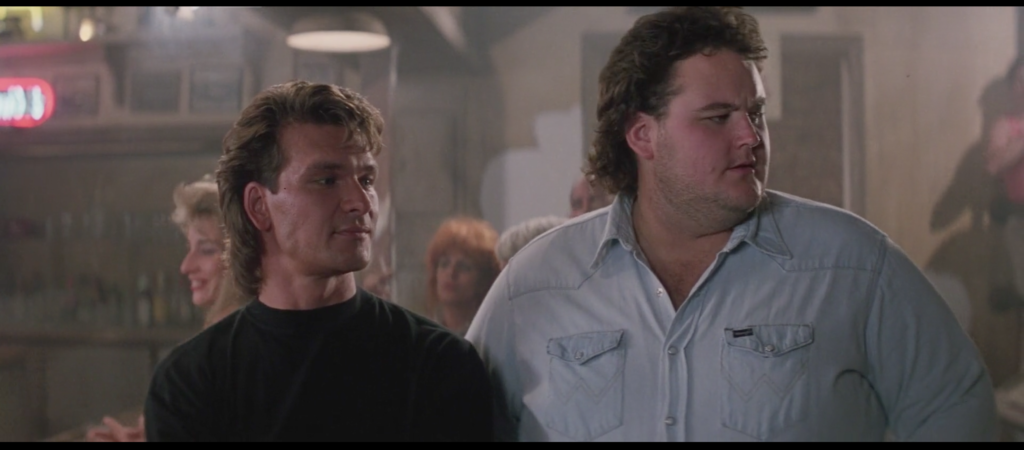
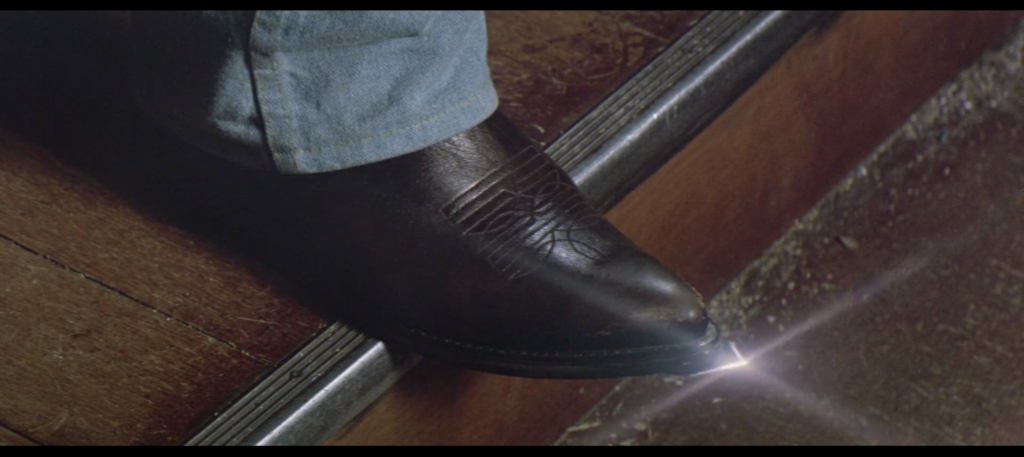
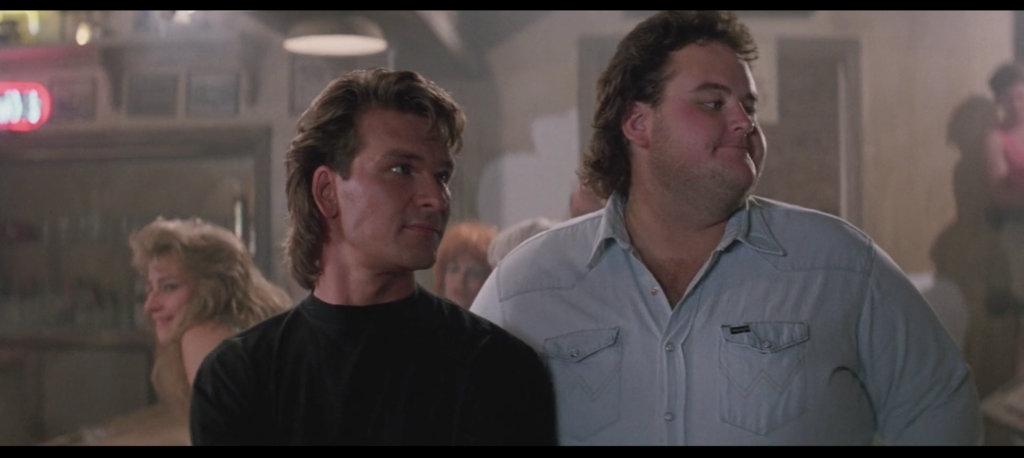
They added a gleam effect to the knife in the boot on the leg of the goon who tries to high-kick Dalton in the head with his knife-mounted boot. Just in case, you know. Even with the closeup—an eyeline match cut from Dalton and his Padawan learner Jack to the boot and then back again (Dalton: “Right boot.” [pause for boot] Jack: “Got it.”)—the audience could have missed it, primarily because even for the kinds of people who might want to watch Road House boot-mounted knives are not the kind of thing you’re trained to spot in the wild. Can’t be too careful, really.
No, really. Let’s review. Never underestimate your opponent. The opponent here is the audience’s inability to recognize a knife sticking out of a Knife Nerd’s shitkicker. Expect the unexpected. You wouldn’t expect someone to miss the knife when it’s one of three things on screen, the other two being the boot and the jeans covering the leg part of the boot, would you? Take it outside. Step beyond the boundaries of yourself and see things through the eyes of others. Never start anything inside the bar unless it’s absolutely necessary. The trouble here started when Brad Wesley, outside the bar, ordered this man to go inside for the express purpose of necessitating violence. Be nice. Dalton’s simply points out the location of the weapon to Jack rather than raising holy hell, a first move echoed when he amasses his bouncers, approaches the boot knife goon with a smile, and simply says the bar is closed. Until it’s time to not be nice. The arrival of the boot knife is the big hand reaching Not Nice O’Clock.
That gleam is not just the light reflected off some jackass’s dopey weapon. It’s Dalton’s bouncer-sense made visible.
029. Knife Nerds
January 29, 2019A person watching Road House from a remove of decades could be forgiven for wondering if packs of pointy-faced dorks with switchblades, roaming the land and stabbing bouncers, were the subject of some sort of ginned-up panic along the lines of Satanic nursery schools and wilding superpredators. No fewer than four blade-wielding wieners try to slice up Dalton before the film is even halfway over. Though as a category they are a distant second to brawlers in terms of goon prominence, they bear examination for what their presence tells us about Dalton’s world.
These two nitwits are the first people in the film to get bounced, from the Bandstand, before Tilghman hires Dalton away from the place to come work at the Double Deuce. The fellow on the right sparks a bounceable incident when he attempts to pay for the attentions of a young woman who finds the offer insulting and pins the hundred-dollar bill he offers her to the table with a knife; he knocks over her chair by planting a kick right between her legs and we’re off to the races. Dalton thinks he and his men have cooled things off, but this weaselly goof yanks the knife right back out of the table and takes a slice out of the cooler’s arm the moment his back is turned. He and his friend Farrah Fawcett are taken outside by Dalton and company, thinking they’re about to throw down with the man himself. (“I’ve always wanted to try you,” says the knife nerd to Dalton prior to exiting the premises. “I think I can take you.” This is another essay entirely.) But their date with immortality is cancelled when Dalton just turns around and goes back inside. They hurl invective at him in an effort to rile his temper or shame him into combat, but not even such vicious insults as “dirtball” and “moose-lips,” which are things these two people yell at the top of their lungs at a man they’re trying to intimidate, can change Dalton’s mind. Later, Dalton will caution the staff of the Double Deuce against taking such insults personally, since they’re just “two nouns combined to elicit a prescribed response.” That knowledge is clearly hard-earned.
This beady-eyed Parrothead is the first person Dalton bounces from the Double Deuce, earning him the undying awe of the people there assembled. All he wants to do is watch his girlfriend dance on a table. Such a fan of her gyrations is he that he attempts to murder, with a knife, the bouncer who asks them to cut it out. “Motherfucker” is his preferred binominal, but what he lacks in creativity he makes up for in extremely loud shirts. Dalton breaks a table with his face, and thus the cooler’s head prevails.
Here’s our old friend Pat McGurn, Brad Wesley’s only sister’s son and the Double Deuce’s now-ex bartender. He’s returned with his fellow goons Tinker and O’Connor in tow to muscle Tilghman into rehiring him, lest Wesley shut down liquor distribution to the bar. When Dalton takes mild, even bemused issue with the idea, Pat whips out a monstrosity that looks like something Legolas would pull out of an Uruk-Hai before lobbing it into another one’s forehead. As he attempts to stab Dalton in the fucking face in front of multiple witnesses in a crowded bar that can be observed clearly through the glass window of the office in which the murder attempt is taking place, he calls Dalton “chicken-dick.” In the end it works out no better for him than it did for Store Brand Crockett and White Tubbs or Hawaiian Punch, but I’m pleased to note that he at least came up with the film’s most ridiculous insult.
For the purposes of this essay I almost didn’t count Ketchum, the unnamed and fundamentally anonymous Brad Wesleyan who drives the monster truck and for whom bladed weapons are a specialty, as we will later learn to tragic effect. Though he is an obnoxious prig, he actually seems like someone you’d think twice about getting in a fight with. That ought to—ought to—elevate him out of Knife Nerd territory. On the other hand, his first knife attack involves attempting to high-kick Dalton in the head with a blade embedded in the toe of his cowboy boot, one of the lamest attempted murders in the movie, and it’s not like the competition isn’t stiff. Dalton catches his leg in midair, twists it savagely, and drags the guy out of the bar on his ass, which he proceeds to kick. Ketchum may look tough. He may even be tough. He doesn’t call Dalton “shit-ass” or “poodle-sack” or anything. But watch him dragged out to the curb like so much stonewashed garbage and then deny the Knife Nerd within at your peril.
All of these men use the blade as surrogate bravery. They may talk a good game—alright, they may talk a game. But when push comes to shove, they attempt to stab. They can whip out whatever they want in their attempt to try and take Dalton. But Dalton’s blade is his body, honed to a nicety, and it will wind up inflicting a far more serious gash than any knife before the story is through. A true cooler is worth a hundred such cowards.
009. Running over a car dealership with a monster truck
January 9, 2019Road House is a film in which a man runs over a car dealership with a monster truck.
Not a car. A car dealership.
He runs it over.
With a monster truck.
They mount a camera between the tires and everything. To capture every nuance. Of running over a car dealership. With a monster truck.
During Wagon Days, no less.
Obviously I’ve known that this happened ever since I first saw the film. I appreciated how over the top it is, even for Brad Wesley and his goons, and even for Road House. The presence of the monster truck at all is…well, it leaps right out at you the first time you see Ketchum drive up to Wesley’s mansion in it, like his brother had borrowed his Mercury Cougar for a trip to St. Louis so he drove his other car to his boss’s house, and his other car just so happened to be a monster truck. But it wasn’t until the other day, when I wrote the phrase “running over a car dealership with a monster truck,” that…no, actually, it was some hours later, when I reiterated the point on twitter. That’s what brought it all home for me. Road House is a film in which a man runs over a car dealership with a monster truck.
It sounds like any other wanton act of vehicular destruction, at first. “Oh yeah, he ran over a c—wait, what?” It takes a second to sink in. The closest point of comparison I can come up with is in the post-show interviews at the end of Waiting for Guffman, when Parker Posey’s character talks about her dad getting out of jail because he didn’t do anything that bad, “he just ruined some property.” Stole, destroyed, sure, whatever, but then you register the word choice. Ruined? Now I’m intrigued. Now I want to know, but also I don’t want to know. You know? Ruining property, like running over a car dealership, is understating an overstatement.
The other film I think of when I think of this moment is Citizen Toxie: The Toxic Avenger IV, because that’s the movie that was in pre-production when I interned at Troma Studios in the summer of 1999. I had very little to do with the finished product; my main contributions were scouting for a production office (unsuccessfully) and taking an uncredited rewrite pass at the screenplay (also unsuccessfully, though interns rewriting screenplays says a lot about Troma).
What I did do was read All I Need to Know About Filmmaking I Learned from The Toxic Avenger, the memoir cum how-to manual by Troma co-founder and creative force Lloyd Kaufman and a then-unknown James Gunn. The idea that’s stuck with me the longest since I read the book, aside from Karo Syrup making the best fake blood, is that if you have any means at your disposal by which to raise the apparent production value of your film, you avail yourself of those means. An eccentric uncle with a crazy-looking house? A rich friend with an insanely nice car? A major urban metropolis with a tourist mecca where there are simply too many people for the cops to catch you should you choose to film someone running naked through Times Square without a permit? (The filming, not the nakedness.) It doesn’t matter whether or not these things are germane to your movie. They look awesome and/or expensive. Make them germane.
I think about this every time I see a movie about barfights at one in the morning set a scene in a Ford dealership in broad daylight where a deranged businessman orders his minion to drive a monster truck through a glass enclosed showroom and over every single new car inside of it. I think about it every time I see the monster truck in this movie at all. Road House had access to a car dealership and Road House had access to a monster truck, ergo Road House has a scene in which a man runs over a car dealership with a monster truck. Those who can, do.
007. Goons
January 7, 2019You can’t make a JC Penney without breaking some eggs. That’s where these fellows come in. Organized crime boss, mall developer, and job creator Brad Wesley employs a small army of goons, thugs, henchmen, minions, and muscle to do his dirty work around the town of Jasper, Missouri. Blowing up an auto parts store, blowing up an old man’s shack, and running over a car dealership with a monster truck are just the most glamorous aspects of the gig: These guys’ main function is to punch people in the face, and get punched in the face in turn. The following is a brief survey of the Wesleyans with speaking parts. You’ll be seeing more of these gentlemen for sure, but this should bring you up to speed.
Morgan
Ornery brute. Originally a bouncer at the Double Deuce. Fired by Dalton because he doesn’t have “the right temperament for the trade.” Doesn’t take it well. Played by pro wrestling legend Terry Funk. Strengths: Looks and acts like a guy who could kick someone’s ass. (Not for nothing did he prompt the “It’s still real to me, dammit!” incident.) Weaknesses: Syllable emphasis.
Pat McGurn
Vicious weasel. Nephew of Brad Wesley. Originally a bartender at the Double Deuce. Fired by Dalton for skimming from the till, sparking the Wesley/Dalton feud. Played by punk legend John Doe. Strengths: Convincingly sleazy mustache. Weaknesses: Uncle’s Boy.
Jimmy
The main man. Wesley’s favorite. Rarely far from his boss’s side. Martial-arts master who fights both Dalton and Wade Garrett to near-standstills. Gets the film’s most famous non-Swayze line: “I used to fuck guys like you in prison!” Played by Marshall Teague. Strengths: Smoldering eyes, witty banter, maniacal laugh, actual fighting skill. Weaknesses: Sore throat.
O’Connor
Middle management. Basso profundo beanpole who leads the expedition to restore Pat to full employment at the Double Deuce, among other crucial tasks requiring minimal competence. Played by Juilliard graduate Michael Rider. Strengths: Business casual wardrobe. Weaknesses: He’s a bleeder.
Tinker
Lummox. Portly core component of the Wesley team. Frequent partner of O’Connor. Partial to trucker hats and suspenders. Played by John Young. Strengths: Comes closer to actually killing Dalton than almost anyone else, inflicting the knife wound that leads to Dalton meeting Dr. Elizabeth Clay; perhaps for this reason he is the only member of the Wesley Organization to find forgiveness and redemption. Weaknesses: Polar bears.
Mountain
The tallest. Towering doofus who serves primarily to dance amusingly during Wesley’s pool party and engage in brief but memorable dick-based repartee with Sam Elliott. Played by Check It Out! with Dr. Steve Brule fry cook Tiny Ron. Strengths: Hell of a dancer, very tall. Weaknesses: “Give me the biggest guy in the world: You smash his knee, he’ll drop like a stone.”
Ketchum
Serious business. Wesley’s most all-American thug. Trusted with the most hardcore tasks. Almost entirely forgettable despite performing several of the film’s greatest acts of villainy unless you’ve seen the movie enough to write about it every day for a year. Played by stuntman Anthony De Longis. Strengths: boot-mounted knife, regular knife, monster truck. Weaknesses: …wait, who are we talking about again?
Karpis
Man of mystery. Piercingly handsome guy in a smart-looking suit worn with rakish dishevelment. Present in background when Wesley’s chopper lands during the character’s introudction. Present in background when Wesley throws a pool party. Wordlessly witnesses Wesley’s punishment of O’Connor for failing to secure Pat’s job. Tosses Red Webster’s store to keep him in line and says “Life is good” as his one line. Vanishes completely from the film after these four scenes. Lives forever in my heart. Played by Joe Unger, aka Sgt. Garcia from A Nightmare on Elm Street. Strengths: Looks like he plays rhythm guitar for Dr. Feelgood or the Strokes circa the $2 Bill show, dangerously sexy. Weaknesses: Barely in the movie, named “Karpis.”

